Romanian transgender man’s landmark case requesting that Romania acknowledges his UK gender recognition referred to the Court of Justice of the European Union
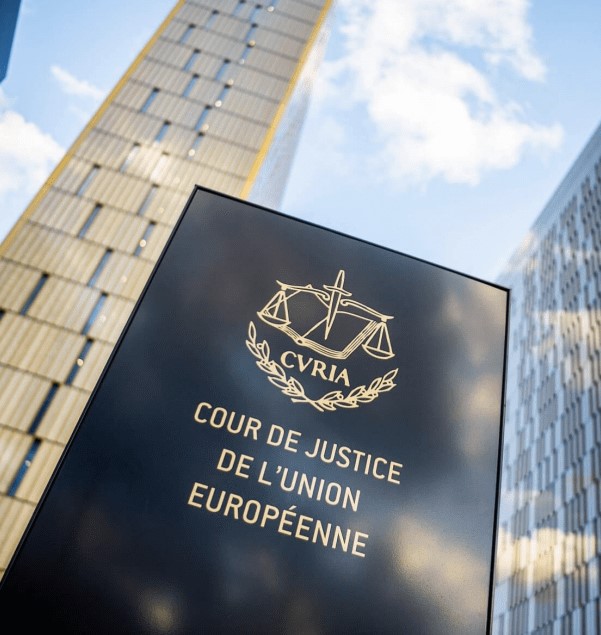
Arian Mirzarafie-Ahi, a transgender man with Romanian and British citizenship, has filed a first-of-its-kind lawsuit in Romania against Romanian authorities over their refusal to recognize his new male name and gender identity acquired in the United Kingdom (while still treated as an EU Member State). The lawsuit, which raised fundamental questions under EU law, has now been referred to the Court of Justice of the European Union (CJEU) in Luxembourg.
ACCEPT Romania, a leading Romanian NGO for LGBTQ+ rights, is helping Arian bring this landmark legal claim before the CJEU to have his new gender identity acknowledged in Romania, in accordance with his free movement and citizenship rights.
Arian began the legal process to change his gender identity markers and name in 2016. He was ultimately granted a gender recognition certificate by the UK authorities in 2020, during the Brexit transition period (when the UK was still treated as an EU Member State).
Romania now refuses to acknowledge the name and gender recognition that Arian received in the UK. Instead, it is demanding that Arian undergo Romania’s own gender recognition procedure, which has already been found to violate the European Convention on Human Rights. As a result, Arian now finds himself with two different identities across two countries, which has impacted his well being, his freedom of movement, and his EU citizenship rights.
This situation is humiliating and deeply affects Arian’s right to dignity under the Universal Declaration of Human Rights and the European Convention on Human Rights. Arian’s ability to travel freely in the EU, like any EU citizen, has been unjustifiably restricted, including his ability to visit family members in Romania, because his Romanian passport displays the wrong identity.
Arian’s case is the first of its kind to reach the European Courts. He hopes the CJEU will side with him and rule that the Romanian authorities should acknowledge his UK gender recognition and issue him new identity documents with the correct name and gender, without subjecting him to the full Romanian gender recognition procedure.
This case could set a precedent for other transgender people whose gender recognition in one Member State is not being acknowledged elsewhere in the EU, harming their ability to travel freely, reside, work or study across the EU, or even to vote.
The Court will also have the opportunity to confirm that the rights that EU citizens lawfully acquired in the UK when it was still treated as a Member State, such as Arian’s gender change, are portable when those citizens wish to exercise their free movement rights.
Arian and ACCEPT are represented by human rights lawyer Iustina Ionescu and assisted by leading international law firm White & Case on a pro-bono basis.
The facts of this case are as follows.
Background to the case
Arian was born in Romania and migrated to the UK in 2008, and later gained dual citizenship. He started the medical and legal transition in the UK in 2016 at the age of 24, and obtained a UK gender recognition certificate in June 2020, when the UK was still treated as an EU member state.
Arian attempted to register his name and gender change with the Romanian authorities in 2021, but his request was denied. Instead, the Romanian authorities demanded that Arian undergo the full Romanian gender recognition procedure before the national courts. That procedure has already been found to be in violation of human rights by the European Court of Human Rights (X and Y v Romania).
Arian then filed lawsuits in the Romanian national court against the Directorate for the Persons’ Records in Cluj, Romania; against the Civil Status Service, the Directorate for the Persons’ Records and the Administration of Databases and against Cluj Municipality represented by Emil Boc, over their refusal to change his identity documents through a simple administrative procedure.
Through this legal action, Arian is requesting that the national courts oblige the Romanian authorities to change his gender and first name, as well as to issue a new birth certificate.
Before Brexit, Arian could have travelled based on his British passport that reflects his gender identity. However, since Brexit, he can exercise his EU citizen rights only through his Romanian identity documents, which do not reflect his gender identity.
Alongside this breach of Arian’s fundamental rights, especially his right to free movement and residence in the EU, this disparity between his Romanian and British documents exposes him to humiliation and discrimination.
Arian has to travel to the EU with a Romanian passport that reflects neither his gender identity nor his appearance, or must travel on his UK passport as a non-EU citizen.
Considering that Arian’s case raises new issues of principle requiring the interpretation of EU law, in particular in relation to free movement rights and EU citizenship, the Romanian court has decided to refer the case to the European Court of Justice for a preliminary ruling. After hearing the parties, both in writing and orally, the Court of Justice will render a judgement that will be binding on the Romanian courts and throughout the EU.
Quotes
Arian said: “My entry into Romania’s territory, the country where I was born and where I have family members that I want to visit, depends on a set of identity documents that do not reflect who I am.
Due to the Romanian State’s refusal to recognise my gender identity and issue updated documents, I have already been a victim of discrimination at Romanian airports.
“All that I want is to be respected as a Romanian and European citizen and to have my Romanian identity documents updated, just as my UK documents were when I transitioned. I want to be able to enjoy all my rights, but especially my right to dignity.”
His lawyer, Iustina Ionescu, said: “The Romanian state once again violates European law and disregards the efforts made by a Romanian citizen to obtain the recognition of his gender identity in another EU Member State.
“For over a year and a half, the Romanian civil status authorities have sent Arian on a fool’s errand – they have forced him to once again go through a procedure that is entirely random in Romania, and that has already been declared by the ECtHR as violating human rights, and that does not guarantee him a solution of the situation.
“Before being European citizens, we are Romanian citizens, and the state should do its duty towards all its citizens. Fortunately, we can turn to European justice to ensure that we receive equal treatment without discrimination. The European Court of Justice has ruled many times that EU member states should refrain from taking decisions that restrict free movement and the rights of EU citizenship, as Romania did in this case.”
Florina Presadă, executive director of ACCEPT, commented: „ACCEPT Association has been working for years to put an end to the discrimination and abuse that the Romanian state subjects transgender persons in Romania by not providing a legal gender recognition procedure and all services required so that transgender persons can exercise their right to self-determination.
We have been providing legal counselling, psychological support and guidance in transition for years for transgender Romanian citizens, and we have also supported strategic litigation cases in order to show, beyond any doubt, that the rights of transgender persons in Romania are being violated. Our goal is to put an end to the current laws, policies and practices leading to the discrimination of transgender persons.
We stand by Arian, as we stand by every transgender person in Romania and in any other EU member state that does not recognize these persons’ rights to self-determination and dignity. We hope this ruling will show that European rights are for everyone, regardless of gender identity or expression.”
Patrick Brăila, trans activist, declares: “Among the Romanians who left for other European countries for a better life, there are also transgender Romanians who work and live in these states, where they managed to obtain citizenship and which became their adoptive countries. One of them is Arian, a Romanian and British citizen, whom the Romanian state humiliated and wronged when it did not recognize his identity and put him in abusive and intrusive situations. We trust that the CJEU will give him justice, thus restoring the dignity of both him and other trans people who know that their rights as European citizens can no longer be violated.”
“To paraphrase Ursula von der Leyen, if you are trans in one member State, you are trans in all member States. This needs to be settled once and for all,” comments Lenny Emson, TGEU Executive Director. “Having to go through the ordeal of having your gender identity vetted several times is unfair and puts trans people at a clear disadvantage when compared to others living in the EU. Romania, in particular, has no quick, transparent, and accessible legal gender recognition procedures, as confirmed by the European Court of Human Rights. We are proud of Arian for claiming his right to enjoy his EU right to freedom of movement.”
Katrin Hugendubel, Advocacy Director at ILGA-Europe added: “This case is just one example of what trans people in the EU have to go through when their gender recognition from a Member State is not recognised in another, forcing them to undergo the full legal recognition procedure again. This is particularly difficult and troubling in those countries that lack an LGR procedure in conformity with international human rights law standards. This judgment from the CJEU will establish a clear obligation to recognise gender recognition from one Member State in another. It will rightfully enable trans people to move freely across the EU, and to enjoy EU citizenship rights on equal footing with everyone else.”
For further information and interviews, please contact Diana Dragomir, Head of communication & PR ACCEPT Romania at diana@acceptromania.ro or Florina Presadă, Executive Director of ACCEPT Romania at florina@acceptromania.ro.
For good and bad: The trending impacts on LGBTI human rights in Europe and Central Asia
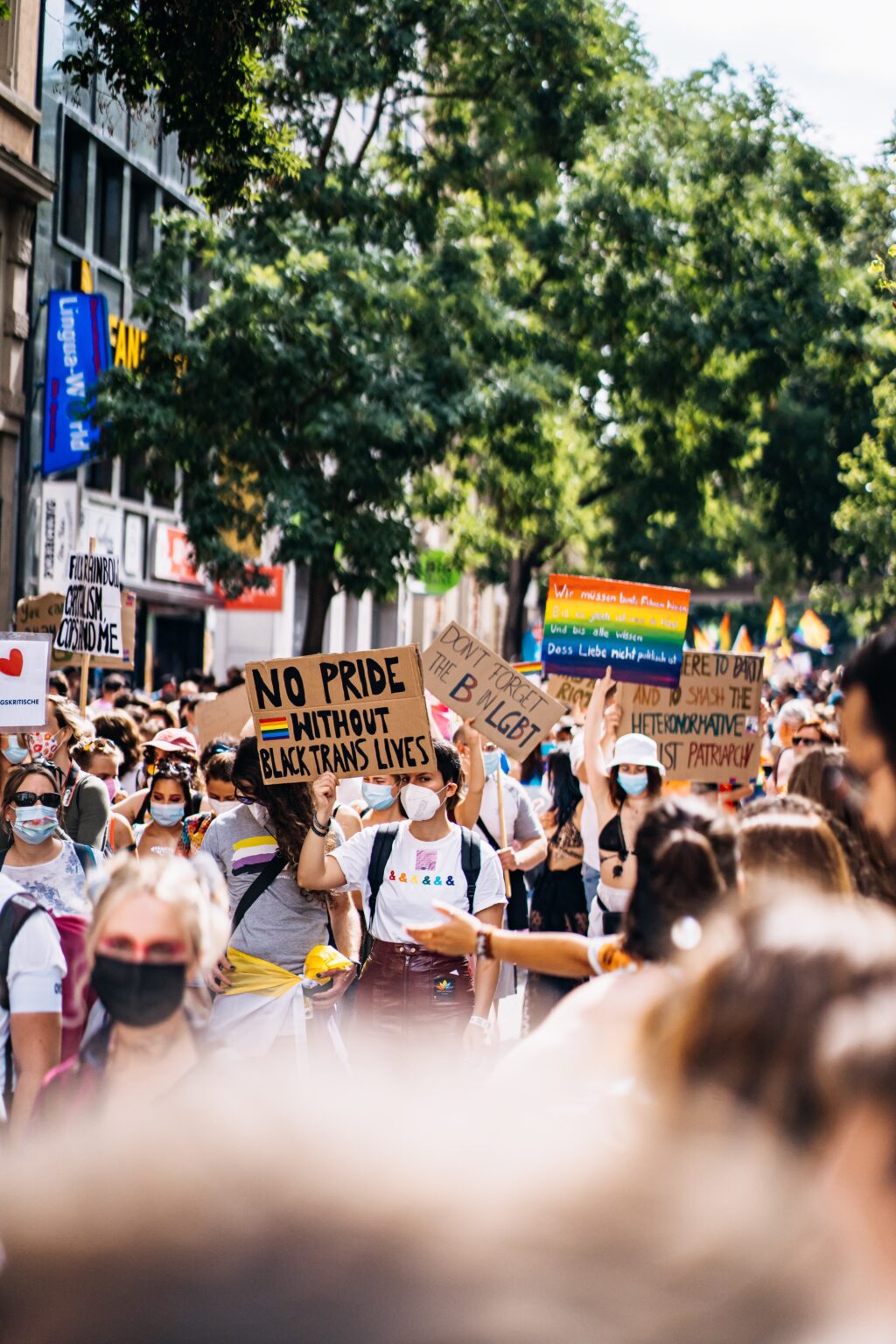
The most striking finding of ILGA-Europe’s Annual Review 2023 is a stark rise in the ferocity of anti-LGBTI hate and violence reported in Europe and Central Asia. But alongside this worrying trend, there are positive developments in areas such as legal gender recognition, public support, intersex human rights and civil society. Here are the key highlights.
At ILGA-Europe we’ve just published our Annual Review, showcasing the main developments and trends in the human rights Situation for LGBTI people in Europe and Central Asia. Disturbingly, the most striking finding this year is the levels of hate reported in the region. 12 years into this yearly reporting, the present edition finds that anti-LGBTI violence in 2022 was more targeted and extreme than ever in the history of our reporting.
Our Annual Review aims to paint a clear picture of the reality from the ground for our communities. It documents individual cases and events, as well as legislative, social and political advancements and regressions, and new available data. All reporting is based on the work of LGBTI activists in each country featured in these pages, as well as on our own work.
While the review points to the devastating consequences of the instrumentalisation of LGBTI people, mostly for political gain, there have been other developments in the direction of human rights and protection of LGBTI people.
We have not seen this severity of the violence before
For years, ILGA-Europe has been documenting the rise in hate while activists across the region have shown how anti-LGBTI speech, both online and by political and religious leaders, translates into violence harming people.
This phenomenon is across the board in this year’s Annual Review. For example, in France, the Ministry of Interior reported a 28% rise in hate crimes between 2020 and 2021. In Switzerland, LGBTI organisations reported a 50% increase between 2020 and 2021. Spain reported a 68% increase in 2021, while in England and Wales transphobic incidents rose by 56%.
There are also more reports than ever before of LGBTI people taking their lives, a clear sign how discrimination, hate speech and harassment are impacting mental health. In Italy, three trans women took their lives. Two of them were teenagers, the third woman was a teacher, who was suspended from school because she had socially transitioned. In Armenia, a young gay couple committed suicide after suffering harassment when a photo of them kissing went viral. These are just a few examples.
Sexual education is increasingly compromised
Education is a growing battleground in the resistance to LGBTI people and rights. In Hungary, as result of law banning LGBT content, teachers reported a fear of bringing sexual orientation, gender identity and other topics to the classrooms. In the Netherlands, 36 orthodox schools require anti-LGBTI declarations from pupils and parents, and the new Italian Prime Minister, Giorgia Meloni has publicly advocated for a ban on sex education in schools and the exclusion of LGBT people in children’s books.
Russia expanded its ‘propaganda law’ to prohibit positive and neutral information about LGBT people and “gender reassignment” to minors and adults. There was an alarming number of ‘propaganda’ charges or threats in educational establishments in the country. All in all, progression on sexual education is being challenged.
Public support for LGBTI people is growing
In parallel, the report finds growing support among societies for LGBTI people, also in countries where we might not expect it. For example, most Hungarians don’t consider ‘homosexual propaganda’ an important issue. In Poland, two thirds of the population support marriage equality and 60% support the abolition of anti-LGBT resolutions in the country.
What’s more, many politicians across Europe have shown their support throughout 2022. Many reacted with horror to the killings in Oslo and Bratislava and the European Parliament has publicly condemned the violations of LGBTI rights. We need more governments standing strong against hate in the media and online and more progress in advancing laws against hate crimes that protect LGBTI people.
There are more legal gender recognition laws that include self-determination
In the face of enormous backlash on trans people, and a number of forces trying to stop legal gender recognition (LGR), some countries made progress in 2022 and others showed a will to ensure a model of LGR based on self-determination.
Scotland, Finland and Spain were the best examples; by adopting LGR laws that include self-determination, these countries are showing a clear way forward for other governments.
Same-sex partnership is back on the agenda
After stagnating for a number of years, same-sex partnership recognition is on the rise again. Andorra adopted legislation to ensure heterosexual marriage and the recognition of same-sex civil partnerships guarantee the same set of rights. In Latvia, following a Supreme court decision ruling that same-sex couples should be given civil status, same-sex couples were recognised in court cases. Slovenia and Switzerland adopted marriage equality, including positive changes regarding adoption rights. Other countries took steps forward the adoption of laws that recognise same-sex partnerships.
While intersex human rights are rightfully taking a space in the agenda
There is also a growing awareness of intersex human rights across Europe. While Greece adopted a ban on non-vital medical interventions on children, the European Commission conducted surveys and interviews for the first EU study on the lives of intersex people and their parents (expected to be published this summer). The Council of Europe is preparing a Recommendation on intersex human rights while the Chair of European Commission against Racism and Intolerance and PACE General Rapporteur for the rights of LGBTI people shared supportive statements.
Behind every positive development, there are LGBTI activists doing hard work
LGBTI organisations and activists across our region are key to all the advances on LGBTI people’s rights and the support to their communities during 2022.
Despite difficult circumstances, more and more Prides are being organised, support for the most vulnerable in the community is provided and work with institutions and policy makers continues advancing LGBTI people rights.
More and more organisations report covering for gaps in service provision, and providing services where the community does not feel safe to access mainstreaming services, for example when it comes to shelter.
The most remarkable support was that of the LGBTI community in Ukraine through LGBTI organisations, as well as the support by activists across Europe for Ukrainian LGBTI refugees.
LGBTI activists are the central players in countries where progress has been made, as we’ve seen in Spain and Finland, where huge effort went into successfully keeping self-determined legal gender recognition on the right political track, despite fierce opposition.
The Annual Review of the Human Rights Situation of LGBTI People in Europe and Central Asia is published every February, as part of our Rainbow Europe package. We thank all those across 54 countries who worked with us to make sure our reporting was accurate.
Find out what’s been happening in your country here.
Bulgaria’s Supreme Court Rejects Baby Sara’s Bulgarian Citizenship

The application for a Bulgarian birth certificate for a child of two mothers, one of whom is a Bulgarian citizen, has been rejected by the country’s Supreme Administrative Court, despite an opposite ruling from the court of justice of the European union.
Arguing that Baby Sara is not a Bulgarian citizen, the country’s Supreme Administrative Court (SAC) said that their decision not to grant a birth certificate to the child of two mothers is final and cannot be appealed.
The case ‘Stolichna obshtina, rayon Pancharevo’ arose at the Court of Justice of the European Union (CJEU) when a same-sex couple were refused a birth certificate in Bulgaria for their infant daughter, who was born in Spain. The Bulgarian authorities asserted that the couple, one of whom is Bulgarian, could not be registered as parents on the child’s birth certificate, leaving the family in legal limbo, and Baby Sara stateless.
In December 2021, the CJEU ruled that it is contrary to the fundamental rights guaranteed by Articles 7 and 24 of the Charter for Baby Sara to be deprived of the relationship with one of her parents when exercising her right of free movement or for her exercise of that right to be made impossible or excessively difficult on the ground that her parents are of the same sex.
The ruling effectively said that if one EU country recognises a child’s parental relationship, then all EU countries should do the same to guarantee the child its freedom of movement across the region, a right enjoyed by all EU citizens.
After the CJEU judgment, the Bulgarian authorities were obliged to recognise baby Sara. In May, a District Court (SES) in the country ordered city hall authorities in the capital city of Sofia to issue a birth certificate to Baby Sara.
However, the SAC overturned this decision, and refused to recognise the child’s Bulgarian citizenship.
Describing the judgement as a “blow” to Bulgaria’s LGBTI community, the organisation Deystvie, who litigated with Baby Sara’s parents, said it “will not stop us”.
“Our struggle is just beginning, and we know we are right. The EU’s court is with us, and this was confirmed by the SES’s decision last May.”
Deadliest Rise in Anti-LGBTI Violence in Over a Decade, our annual Report Shows

12 years into annually reporting on the human rights situation of LGBTI people, Europe’s leading LGBTI equality organisation finds that pervasive hate speech across the region has led to life or death consequences.
Launched today in Brussels, ILGA-Europe’s Annual Review of the Human Rights Situation of LGBTI People in Europe and Central Asia finds that 2022 was the most violent year for LGBTI people across the region in the past decade, both through planned, ferocious attacks and through suicides in the wake of rising and widespread hate speech from politicians, religious leaders, right-wing organisations and media pundits.
This is the 12th edition of ILGA-Europe’s report, which has charted the growing phenomenon of anti-LGBTI speech, as antipathy for LGBTI people has been driven and then exploited for political gain. It finds that as a result, attacks on LGBTI people with a conscious and deliberate will to kill and injure have increased to unprecedented levels, including two terror attacks outside LGBTI bars in Norway and Slovakia, which combined killed four people and maimed 22. There are reports of more murders and many suicides of LGBTI people across Europe, and not only in countries that are seen to be more regressive.
According to ILGA-Europe’s Executive Director, Evelyne Paradis: “At ILGA-Europe, we have been saying for years now that hate speech in all its forms translates into actual physical violence. This year, we have seen that violence become increasingly planned and deadly, leaving LGBTI people feeling unsafe in countries across Europe. We have seen proof that anti-LGBTI hate speech is not just the words of marginal leaders or would-be autocrats, but a real problem with dire consequences for people and communities. This phenomenon is not only in countries where hate speech is rife, but also in countries where it is widely believed that LGBTI people are progressively accepted.”
The report finds that while hate speech and its consequences have reached critical levels, national and local courts are reacting and prosecutions are on the rise in several countries. But according to Paradis, reaction is not enough.
“While we are getting better at dealing with outcomes, the focus has to be on stopping hate speech in all its forms. Across Europe, many politicians have reacted with horror to the killings of LGBTI people this year, and while clear expressions of solidarity are always needed, it does not address the foundation of the problem, which is the proliferation of using hatred against LGBTI people for political gain. Our leaders need to find ways to proactively fight the rise of hate speech, rather than finding themselves in the position of reacting to its consequences.”
It is not all bad news. There has been much progress reported in several countries, with the Review consistently finding that it is activists and their communities who are driving positive social change and managing to push legal protection forward, despite organised opposition.
According to Katrin Hugendubel, Advocacy Director with ILGA-Europe: “LGBTI activists are the central players in countries where progress has been made, as we’ve seen in Spain and Finland, where huge effort went into successfully keeping self-determined legal gender recognition on the right political track, despite fierce opposition. This is true of every issue that affects LGBTI communities across the region, showing that LGBTI people and organisations remain empowered and continue to make change happen.”
The 12th ILGA-Europe Annual Review is available here, alongside all the previous Annual Reports, charting the phenomenon of rising anti-LGBTI hate speech in Europe and Central Asia, and its consequences.
According to Paradis: “These successive reports tell a story of cause and effect that is not going to go away or diminish until politicians and policy makers understand that they have to get ahead of the problem. In the current climate, progressive leaders must find effective ways to tackle hate speech in all its forms, instead of finding themselves on the back foot, expressing sympathy for the families of the needlessly murdered, or those who have taken their own lives, while hatred continues to be fostered and exploited.”
For further comment, contact: Ana Muñoz Padrós, ILGA-Europe: ana@ilga-europe.org, +32 493 35 60 55
European Court rules against Lithuania labelling LGBTI-inclusive fairytale book harmful to children
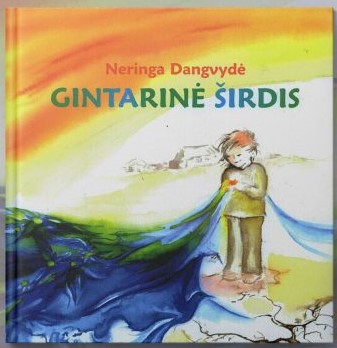
Today, the European Court of Human Rights found a violation of Article 10 (freedom of expression) on the account that labelling a book of fairy tales as harmful to children solely because of LGBTI content breached the European Convention.
Published in 2013 by the Lithuanian University of Educational Sciences and written by the late lesbian writer, Neringa Dangvyde Macate, the book was entitled ‘Amber Heart’ (‘Gintarinė širdis’), and contained fairy tales aimed at nine-ten-year olds, with partial funding from the Ministry of Culture. Adapted from traditional fairy tales, ‘Amber Heart’ included characters from different ethnic groups or with intellectual disabilities and addressed issues such as stigmatisation, bullying, divorced families and emigration. Two of the six fairy tales in the book had story lines about relationships and marriages between persons of the same sex.
On the book’s publication, eight members of the Lithuanian Parliament sent a letter to the University, relaying to it concerns expressed by associations representing families about literature which “sought to instil in children the idea that marriage between persons of the same sex was a welcome phenomenon”.
The Inspectorate concluded that the two fairy tales which depicted same-sex couples did not comply with a provision in Lithuania’s ‘Minors Protection Act’, stating that any information which “expresses contempt for family values” or “encourages a different concept of marriage and creation of family than the one enshrined in the Constitution or the Civil Code” is considered as having a negative effect on minors. The Inspectorate recommended that the book be labelled with a warning that it might be harmful to children under 14 years of age.
The University’s publishing house suspended distribution of the book in March 2014. A year later distribution was resumed, with the book bearing a warning label, in line with the Inspectorate’s recommendation.
Macate lodged civil proceedings against the University, arguing that depiction of same-sex relationships could not be considered harmful for children of any age, but in 2019 the courts ultimately endorsed the measures taken against the book and dismissed her claim. In particular, the Vilnius Regional Court found that certain passages were too sexually explicit and that the way in which the fairy tales depicted a new family model raised the question of whether the applicant herself had sought to discriminate against those who held values different from her own.
In 2020, Neringa Dangvyde Macate passed away and her mother continued proceedings on her behalf, taking the case to the European Court. ILGA-Europe had intervened in this case jointly with Article 19 and Professor David Kaye (former UN Special Rapporteur on Freedom of Expression). Read more about our intervention here.
In today’s Grand Chamber judgment, the European Court held, unanimously, that there had been: a violation of Article 10 (freedom of expression) of the European Convention on Human Rights. The Court found that the measures against the applicant’s book had intended to limit children’s access to information depicting same-sex relationships as essentially equivalent to different-sex relationships.
In particular, it could not see how, according to the national courts and the Government, certain passages – a princess and a shoemaker’s daughter sleeping in one another’s arms after their wedding – had been sexually explicit. Nor was it convinced by the Government’s argument that the book had promoted same-sex families over others. To the contrary, the fairy tales had advocated respect for and acceptance of all members of society in a fundamental aspect of their lives, namely a committed relationship.
As a result, it concluded that restricting children’s access to such information had not pursued any aims that it could accept as legitimate.
Welcoming the judgement, ILGA-Europe’s Head of Litigation, Arpi Avetisyan said, “The Court’s message is clear: Protection of children cannot be used as an excuse for censoring information about LGBTI rights, both on the part of the authors for promoting diversity and equality, and for children to learn about acceptance of all members of the society on an equal footing.
“This case also sends another important message, which is that all families are equal. In the Court’s own words: Promoting one type of family at the expense of another is never acceptable under the [European] Convention.”
The Court ordered Lithuania to pay 17,000 Euro to cover non-pecuniary damages and litigation costs. The funds are to be paid to the author’s mother.
After Polish Case, CJEU Rules to Protect Self-employed Workers based on Sexual Orientation
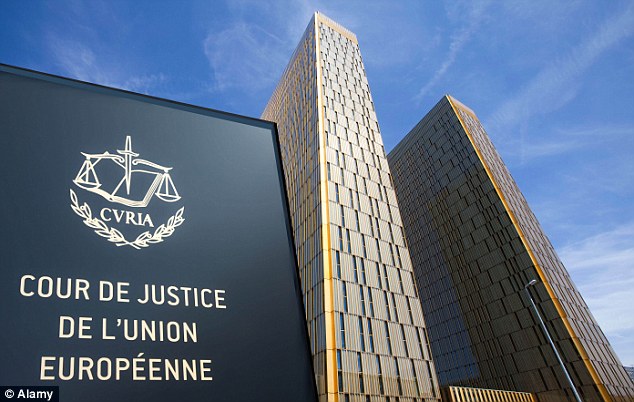
With EC infringement procedure against Poland still outstanding, the Court of Justice of the European Union (CJEU) has ruled that sexual orientation cannot be a reason to refuse or conclude a contract with a self-employed worker.
In December 2017, a self-employed worker and his partner published a music video on YouTube aimed at promoting tolerance towards same-sex couples. Shortly after the video went public, the worker’s shifts were unilaterally cancelled by his employer, Poland’s public television channel. Subsequently, no new contract for specific work was concluded with him.
For seven years up to release of the video, the freelancer had prepared audiovisual material for TP, a company that operates a nationwide public television channel in Poland. Considering himself to be a victim of direct discrimination based on his sexual orientation, the worker brought an action for compensation before the District Court of Warsaw.
The District Court sought guidance from the CJEU, wanting to know whether the EU Directive 2000/78 on equal treatment in employment and occupational activities precludes Poland’s national legislation. That legislation allows an employer not to conclude or renew a contract with a self-employed worker, based on that person’s sexual orientation, on the basis of the freedom of choice.
The EU Directive 2000/78, which covers a wide range of occupational activities, establishes a general framework for combatting discrimination based on sexual orientation. Therefore, the court was tasked with deciding whether the situation the self-employed worker found himself in fell under the directive.
In its judgement delivered today, the CJEU holds that the Directive 2000/78 must be construed broadly, covering the access to any occupational activity, even if the worker is self-employed under contract with an employer.
The Court noted that the directive seeks to eliminate, on grounds relating to social and public interest, all discriminatory obstacles to access to livelihoods and to the capacity to contribute to society through work, irrespective of the legal form in which it is provided.
According to ILGA-Europe’s Head of Litigation, Arpi Avetisyan, “Today’s judgement is another important step forward in strengthening the protection against discrimination in the workplace. The judgement clarifies that EU law protects from discrimination based on sexual orientation also for self-employed and thus reinforces the protection against discrimination equally for the self-employed across the EU. The judgement is especially crucial for LGBTI people in those municipalities in Poland which still have anti-LGBTI resolutions or family charters in place. We hope that Polish authorities will take the necessary steps to implement this judgement swiftly and make it a reality.”
In the summer of 2021, the European Commission (EC) announced infringement procedures against Poland and Hungary for the violation of fundamental rights of LGBTI people and non-cooperation on the matter. While the Hungarian case has been forwarded to the CJEU, the Polish case, despite theoretically being on the same institutional timeline, has not been brought to the CJEU yet, and no up-date is available at this moment of time.
“For years now, we have been observing some EU member states consistently testing EU democracy and the protection of the rule of law and fundamental rights. The infringement procedures sent a clear signal that enough is enough, and the EC needs to see it through.”
Katrin Hugendubel, Advocacy Director, IlGA-Europe
According to ILGA-Europe’s Advocacy Director, Katrin Hugendubel: “In opening infringement procedures, the EC finally clearly stated that the Polish government is violating fundamental rights and that the EC cannot tolerate such violation and the unwillingness of the government to engage in sincere cooperation.
“Even if a few regions have withdrawn the so-called ‘LGBT free zone’ declarations, the discriminatory declarations still prevail on municipal, local and also regional levels. In order not to lose credibility, the EC needs to follow through the infringement procedure and to ensure that all such discriminatory resolutions are repealed.
“For years now, we have been observing some EU member states consistently testing EU democracy and the protection of the rule of law and fundamental rights. The infringement procedures sent a clear signal that enough is enough, and the EC needs to see it through.”
LGBTI organisations welcome EU parental recognition proposal with the best interests of the child at its core

EU-wide parenthood recognition is key in ensuring equal protection for all children in the Union, say ILGA-Europe and NELFA.
Today, the European Commission published a proposal for a Council Regulation on recognition of parenthood, which sets out the full recognition of parenthood for cross-border movement within the EU, while ensuring every child’s fundamental rights are fully protected everywhere in the EU.
According to Europe’s LGBTI umbrella organisation, ILGA-Europe, and the Network of European LGBTIQ* Families (NELFA), this is a major step forward for bringing legal security for children in cross-border situations to have their family life protected and having both their parents recognised across the EU. Currently, many children, including children of LGBTI parents, ‘lose one parent’ when crossing a border because of parenthood not being recognised.
The Council Regulation builds on recent rulings of the Court of Justice of the European Union (CJEU), particularly the one delivered in the case of Baby Sara in Bulgaria (V.М.А. v Stolichna obshtina), requiring EU member states to recognise a parent-child relationship for the purposes of permitting a child to exercise without impediment, with each parent, the right to move and reside freely within the territory of all the member states, as guaranteed in Article 21(1) Treaty on the Functioning of the European Union (TFEU).
The current lack of recognition of parental ties in cross-border situations means that a parent in one country is not always a parent in another country. Moving from one EU member state to another, for holidays or residence, children might ‘lose’ a parent and in very serious cases, such as the Baby Sara case, have ended up being stateless. This lack of parental recognition can have very serious negative consequences for children in rainbow families, such as depriving them of their succession, or their right to have any one of their parents act as their legal representative in matters such as medical treatments, childcare and education.
In line with international human rights law, the proposal puts the best interests of the child at the core, to ensure that children’s right to identity, nationality, non-discrimination and succession and maintenance rights are protected across the EU. This is a major step forward, which LGBTI rights organisations, including ILGA-Europe and NELFA, have consistently lobbied for until now. In doing so, the regulation addresses broader family issues, and thus does not interfere with the substantive law on family matters which falls within the competence of member states.
According to Executive Director of ILGA-Europe, Evelyne Paradis: “Ensuring that children have their parents fully recognised when moving across the EU is an essential condition for their best interests and their fundamental rights. This proposed law is doing so, without impeding on the competence of member states to define a family and establish parenthood under their jurisprudence.
“Currently, rainbow and other families often face a burden to establish filiation through court systems and the legal costs that entail. Having legal certainty on recognition will reduce serious concerns and problems that rainbow families face when travelling or moving in the EU.”
President of NELFA, Eleni Maravelia, says: “Rainbow Families in Europe are very pleased with the legislative proposal by the European Commission, because it would strengthen the rights of children in cross-border situations, as guaranteed by the Treaties. In particular, the new law can help to avoid longer periods of statelessness and other serious legal limbo effects for minors – including the loss of essential familial ties, social benefits and parental obligations. Unfortunately, many children still experience such difficulties in the European Union in various shapes and shades. It’s time for a change. Every child needs full recognition and protection, regardless of their living environment.”
ILGA-Europe and NELFA will now work with MEPs and EU governments to ensure that the proposal is supported through the European Parliament and Council, and that the aim of the proposal is maintained in the final legislation.
ILGA-Europe also welcome today’s publication of a proposal to set binding minimum standards for Equality Bodies by the European Commission. The proposal would strengthen the independence, powers and resources of equality bodies in EU Member States. However, we regret that the European Commission is not proactively seeking ways to include the protection of trans and intersex people in the proposal. Working with Equinet and their membership, ILGA-Europe has seen a lot of interest in widening protection to fully include trans, intersex and non-binary people, and many countries across Europe have started to include gender identity and sex characteristics in their list of protected grounds.
Says Evelyne Paradis: “While we recognise the limitations of the EU treaty, the EC should, in line with EU case law and international human rights standards, encourage member states to not exclude large parts of the LGBTI community from their anti-discrimination protection.”
For further comment, contact: Ana Muñoz Padrós, ILGA-Europe: ana@ilga-europe.org
The Frontline: LGBTI Equality and Accession to The EU
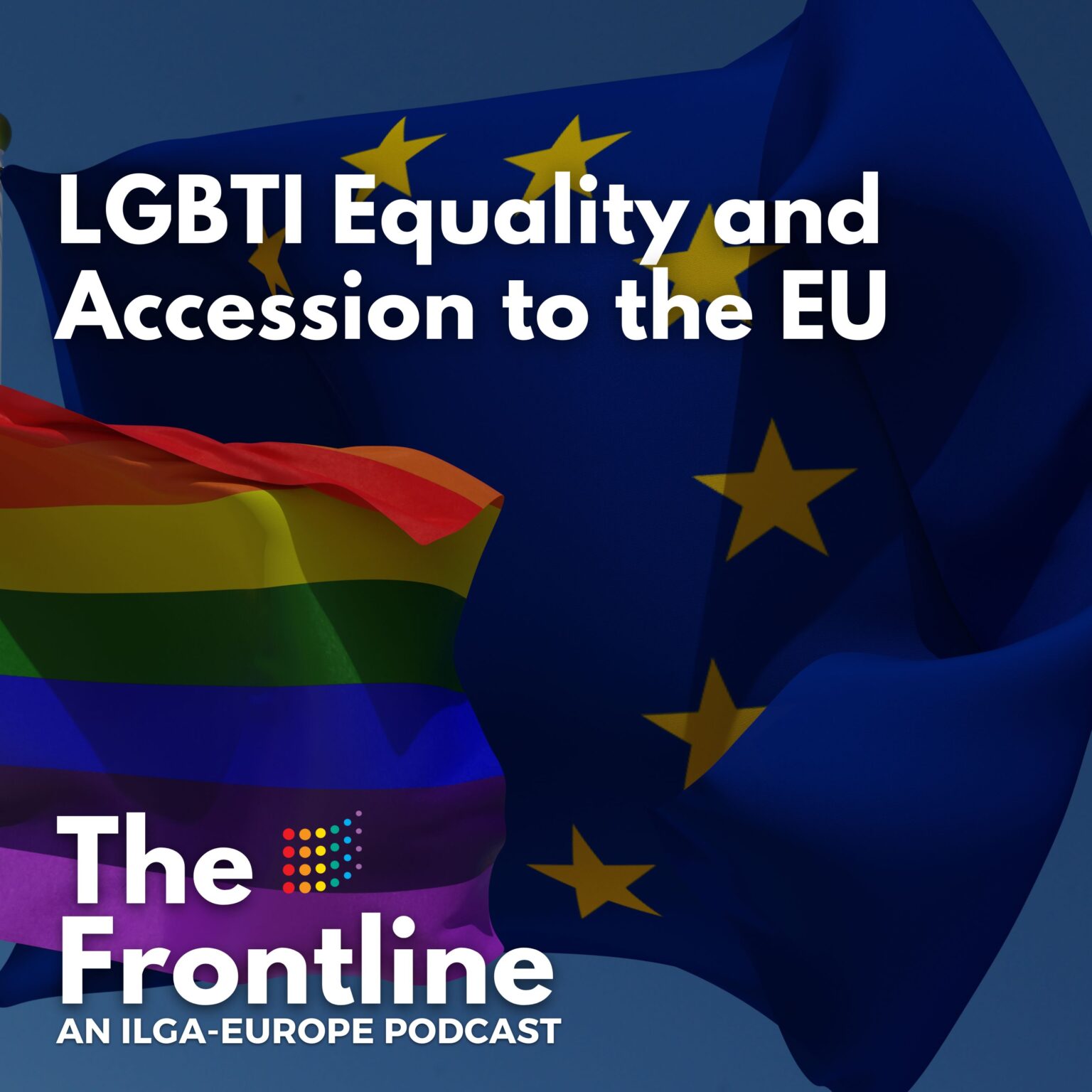
In this two-part episode of The Frontline podcast, presented by Belinda Dear, we’re looking at the new wave of accession to the European Union and what it will mean for LGBTI people.
With the recent news that Ukraine and Moldova are now candidates to the EU, the topic of EU accession is on the radar again, while Western Balkan countries such as Serbia, North Macedonia and Montenegro have been going through the process for some years now, and Turkey not acceded since its application in 1987.
With the current state of LGBTI rights in Central Europe, highlighted most recently by the Serbian government’s anti-democratic instrumentalising of LGBTI people in an effort to try to stop EuroPride in Belgrade, how does this kind of backsliding play into the accession process? And what about countries like Ukraine, where LGBTI rights have barely been on the governmental agenda? What are the opportunities to be gained by candidacy for joining the EU?
To discuss these questions and more, we’re joined by former member of European Parliament, Marije Cornelissen, who has worked extensively on the accession process, Lenny Emson from Kyiv Pride in Ukraine, Anastasia Danilova from GENDERDOC-M in Moldova, and Danijel Kalezić, who worked for years as the Executive Director of Queer Montenegro, but has now become the Co-director of ERA, the LGBTI Equal Rights Association for the Western Balkans and Turkey . We’re also joined by our Advocacy Director, Katrin Hugendubel to talk about ILGA-Europe’s deep and long-term experience of working on accession countries, which has been happening for 25 years now.
Listen below or click here to listen and subscribe to The Frontline on your favourite podcast platform.
Sexual orientation is not a reason to terminate a contract with a self-employed worker, says Advocate General of the CJEU
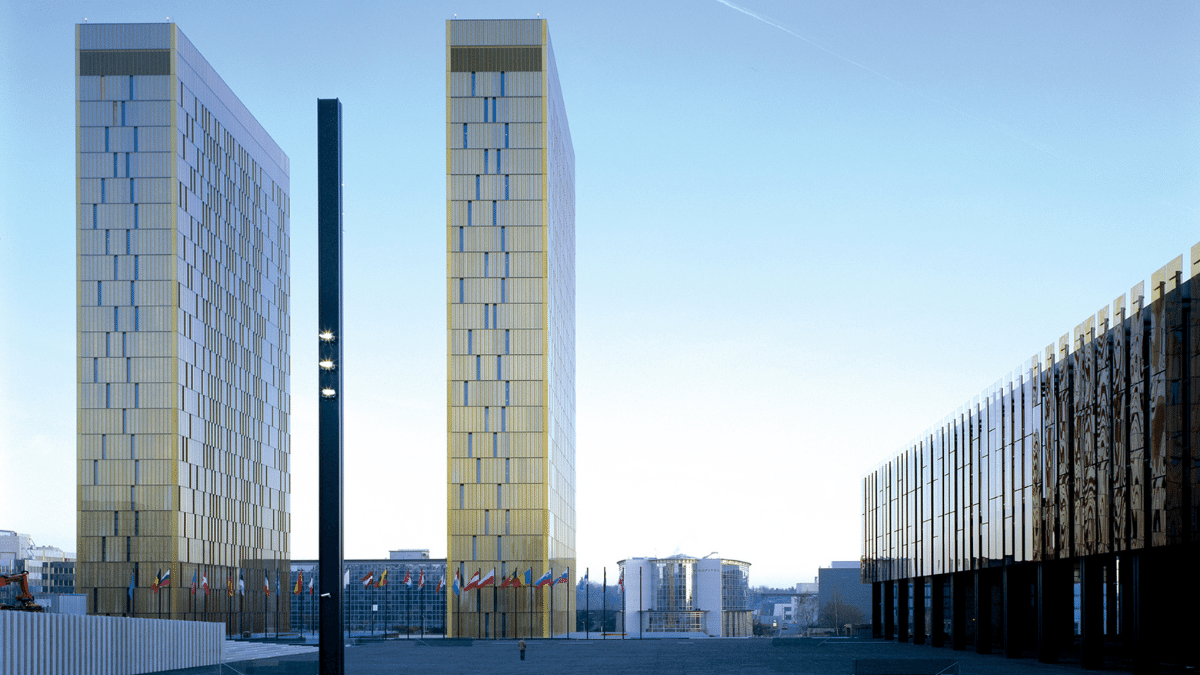
Today, the Advocate General of the CJEU has issued an opinion in the case of J.K. vs the Polish public broadcaster company TP, stating that discrimination based on sexual orientation in employment is not acceptable under EU law.
ILGA-Europe welcomes the Advocate General of the Court of Justice of the European Union’s (CJEU) opinion, published today in the case C-356/21, concerning the refusal to continue a contract of work with a self-employed person on the basis of that person’s sexual orientation violates EU law.
The applicant, J.K., is seeking compensation from the Polish public broadcaster TP for the breach of the principle of equal treatment on the grounds of sexual orientation in the form of direct discrimination in the context of the employment relationship between the two parties. J.K is openly a member of LGBTI community, and together with his partner, he engages in the activism for LGBTIQ+ rights, including running a popular YouTube Channel.
The Defendant is the Polish public broadcaster TP, a nationwide public TV network fully owned by the State Treasury. During 2010 – 2017, the employment relationship between the Applicant and the Defendant was based on regularly concluded, consecutive short-term contracts for specific work.
In December 2017, the Applicant and his partner released a Christmas video on their YouTube Channel, where they appeared among other members of the LGBTIQ+ community. Two days after the video was posted, the Applicant received an e-mail from his immediate supervisor cancelling his scheduled shifts. He was also informed that the Defendant was not planning to cooperate with the Applicant any longer. He was replaced by another employee, who had neither the qualifications nor the experience to perform the tasks previously performed by the Applicant.
In her opinion the Advocate General firstly confirmed that self-employment is covered under the Directive and by covering the area of ‘employment and occupation’, the “Directive aims at enabling citizens to realise their potential and earn their living by providing their work”. Furthermore, in addressing the issue concerning “conditions for access to self-employment”, the AG suggests that the Directive covers both initial stage of concluding a contract, but also the provision relating to the termination of contractual relationship. At all stages, discrimination based on sexual orientation is not acceptable.
According to Arpi Avetisyan, Head of Litigation with ILGA-Europe: “Advocate General Capeta’s opinion is a welcome confirmation that discrimination based on sexual orientation has no place under the EU Directive, including for self-employed workers. We hope the Court will follow the Advocate General’s opinion and build on it so that EU law in this area protects self-employed workers ensuring equal access to employment. Freedom to choose a contracting party does not imply freedom to discriminate.”
Progress in Legal Gender Recognition measures is slow, Council of Europe report says
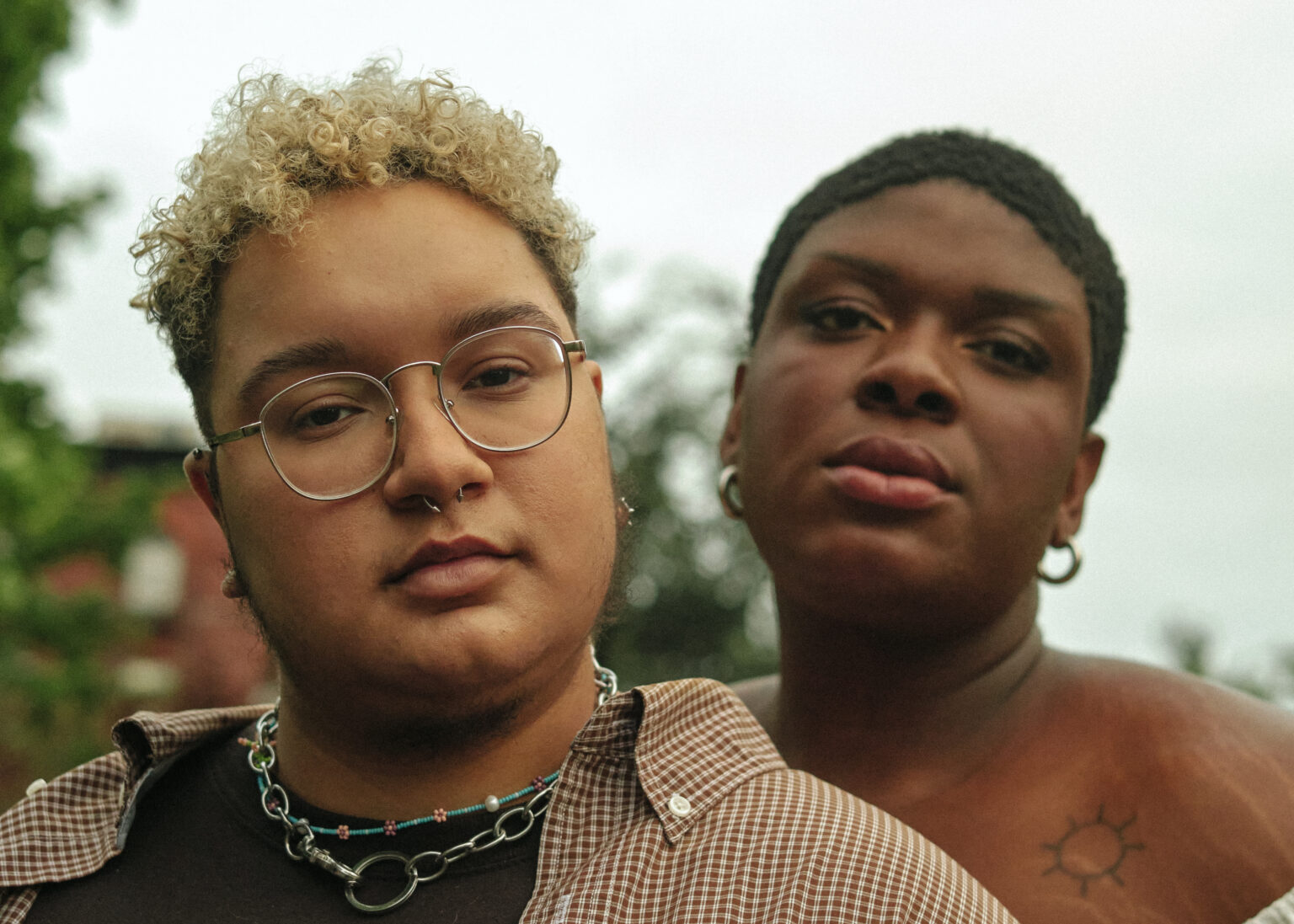
Depathologisation, family rights and access to legal gender recognition for minors are among the key steps that national governments must take to advance the rights of trans people, according to a new Council of Europe report.
LGBTI people’s rights, including the concept legal gender recognition (LGR), are adequately protected in many European countries, but there are significant differences, a recent Council of Europe report reveals. 38 countries out of 46 Council of Europe members have LGR procedures in place, out of which nine are based on self-determination. However, in others there are no clear procedures, while some have even rolled back existing protections, leaving trans people at risk of violence and discrimination while their documents do not match their identities.
While the report acknowledges advances in legislation, practices and public attitudes, progress is slow and key actions are needed to depathologise trans people, to protect their relatives from abusive measures, and to ensure access to LGR procedures for minors.
Here are the key findings:
Depahologisation of gender recognition procedures is urgent
Shocking as it may sound, 13 European countries still require the sterilisation of trans people who want to follow an LGR procedure. This is contrary to the European Court of Human Rights case law, as is demanding medical diagnosis, which 26 countries still do. Finally, there is limited progress in ensuring that being trans is not a mental illness, as well as addressing other issues.
Married trans people should not be forced to divorce
In 19 member states, married trans people must divorce if they want to access LGR. Trans people are forced to choose between their marriages and their identities because of this requirement, which also has an adverse impact also on their spouses and children, as they will lose family-based rights.
This said, there are positive developments: in six countries being single is not a requirement to access LGR and in nine others marriage certificates are updated accordingly.
The best interest of the child should come first
LGR is accessible to children and teenagers in 17 Council of Europe member states. The best interest of the child principle should come first when reviewing limits in age, instead of discussions on the maturity of the applicants. When young trans people cannot access LGR, they are at risk of discrimination.
What about non-binary, gender-diverse and intersex people? What about non-nationals?
The Council of Europe encourages member states to learn from each other and to review the necessity of including gender markers in official identity documentation with regard to non-binary, gender-diverse and intersex people. As for making LGR accessible to non-national residents, the European Court’s case law may provide guidance when re-evaluating existing restrictions.
Other important recommendations
In the report, the Council reminds that equal treatment laws should come along with equal policy measures and regular monitoring. Countries who have no anti-discrimination legislation are encouraged to introduce it, marking gender identity and sex characteristics as grounds for aggravating circumstances.
Update: The Rights of Rainbow Families in the EU

The Court of Justice of the EU has ruled in two occasions over recent months that EU countries must protect the freedom of movement of rainbow families. This is a right all EU citizens should enjoy, LGBTI people too. In today’s blog, we bring you the state of LGBTI people’s family rights in different EU countries.
Baby Sara and Baby Sofia are too little yet to understand the change they’ve brought about for rainbow families in the EU. They don’t know that they share similar experiences. Both were born in Spain to lesbian couples and both were at risk of statelessness during the first years of their lives.
For quite some time, Sofia, daughter of Irish and Polish mothers, and Sara, daughter of British and Bulgarian mothers, did not have access to identity documents and couldn’t leave Spain. One of the reasons was that the countries of one of their mothers, Bulgaria in the case of Sara, and Poland in Sofia’s, refused to recognise the birth certificate issued in Spain because the parents in the documents were two persons of the same sex. After the Court of Justice of the EU rulings on their cases, both Sara and Sofia have helped to further the protection of rainbow families’ rights in the European Union.
First it was Baby Sara. At the end of 2021, the CJEU issued a landmark judgment in her case, stating that if one EU country recognises the child’s parental relationship, as Spain had done, then all EU countries should do the same, and so guarantee the child its freedom of movement across the region, which is a right of all EU citizens. The court decreed that Bulgarian authorities must issue an identity card or a passport to baby Sara, and that all other EU countries should recognise and follow this ruling.
In June 2022, the CJEU confirmed this in the reasoned order in the case of Baby Sofia’s, stating something very similar: when an EU country has recognised two persons of the same sex as parents of a child, then the EU country of which that child is a national, should issue identity documents to that child with both parents on them, and all EU countries should protect the right to freedom of movement of the child and their family. Poland has been told that it must now provide the child with identity documents and guarantee her and her parents the right to move and reside freely in the country.
These are protections granted in Articles 20 and 21 of the Treaty on the Functioning of the European Union (TFEU) and Articles 7 and 24 of the Charter of Fundamental Rights of the EU, among others.
The cases of Baby Sara and Baby Sofia have strengthened the freedom of movement of LGBTI families across the EU as citizens of the Union, which does not necessarily translate into changes in national legislation Union. The family rights of LGBTI people vary significantly across the Union.
Have a look at the family rights of LGBTI people in the EU:
13 countries recognise marriage equality and joint adoption for same-sex couples.
They are: Austria, Belgium, Denmark, Finland, France, Germany, Ireland, Luxembourg, Malta, Netherlands, Portugal, Spain and Sweden.
Bonus: Some weeks ago, Slovenia’s Constitutional Court ruled that marriage is a life union of two persons, paving the way for same-sex marriage and adoption. The Court gave the Slovenian Parliament six months to comply with this decision.
In 13 countries registered partnership with similar rights to marriage is possible for same-sex couples
They are: Austria, Croatia, Cyprus, Greece, Hungary, Ireland, Italy, Luxembourg, Malta, Netherlands, Portugal, Slovenia and Spain in some regions.
Additionally, in seven countries same-sex couples have access to registered partnership with limited rights.
In 11 countries, medically assisted insemination is available for same-sex couples and singles
They are: Belgium, Denmark, Finland, France, Ireland, Luxembourg, Malta, Netherlands, Portugal, Spain and Sweden.
In Austria, only couples have access and in Latvia, only singles.
Only 4 countries of the EU, Belgium, Malta, Slovenia and Sweden, recognise trans parenthood.
Rainbow families have the right to move and reside freely, EU court reiterates

The Court of Justice of the EU has stated that birth certificates issued in an EU country must be recognised across the EU, and that EU countries should protect the freedom of movement of rainbow families.
On June 24, the Court of Justice of the European Union (CJEU) issued a reasoned order establishing that when an EU country has recognised two persons of the same sex as parents of a child, then the EU country of which that child is a national, should issue identity documents to that child with both parent on them, and all EU countries should protect the right to freedom of movement of the child and their family. This is a confirmation of a previous landmark judgment, that of Baby Sara.
Poland has been told that it must now provide the child known as Baby Sofia, born in 2018 to Irish and Polish mothers, with identity documents and guarantee her and her parents the right to move and reside freely in the country.
The case arose when Poland denied citizenship to baby Sofia, daughter of two mothers, Kashka, from Poland, and Sinéad, from Ireland. In 2018, Sofia was born in Spain, where the couple had gone to receive IVF treatment. Spanish authorities issued a birth certificate with the name of the two mothers but not identity documents, as children of foreigners are not automatically entitled to citizenship in the country.
At that time, in Ireland, two women could not be recognised as parents on a birth certificate. In the eyes of Irish law, the mother was the woman who gave birth to the child. As Kasha, the biological mother was not Irish, Sofia couldn’t apply for citizenship in Ireland either.
In Poland, where rainbow families are still not recognised, authorities refused to recognise Sofia’s birth certificate, depriving her of access to citizenship and identity documents. For over two years Sofia remained without any documentary proof of any nationality, and therefore at risk of statelessness. The family was could not leave Spain, as Baby Sofia couldn’t travel without documents. Her mothers had to move house every couple of months, as they were running out of savings.
Now, the CJEU has stated that an EU country is obliged to provide identity documents to a child when the child, being a national of the country, has a birth certificate issued in another member state that designates two persons of the same-sex as their parents. All EU countries must respect the documents that allow the child and their family to exercise their right to move and reside freely with the territory of the EU. These are protections granted in Articles 20 and 21 of the Treaty on the Functioning of the European Union (TFEU) and Articles 7 and 24 of the Charter of Fundamental Rights of the EU, among others.
With this reasoned order, the CJEU has confirmed the landmark judgment delivered in the Baby Sara case last year, which arose when a same-sex couple were refused a birth certificate in Bulgaria for their daughter, also born in Spain. Poland must now provide Baby Sofia with identity documents and guarantee her and her mothers the right to move and reside freely in the country.
In the meantime, Spain issued identity documents to Sofia in March 2019. Spanish law foresees a safeguard measure that allows children born in its territory who would otherwise be stateless to acquire Spanish nationality at birth. The couple also applied for Irish citizenship for Sofia through naturalisation over two years ago, but they have not received any feedback since March 2020. The Children and Families Relationship Act, which allowed both women in a same-sex couple to be automatically recognised on their child’s birth certificate, was enforced in Ireland in May 2020.
Welcoming the order, but concerned about its implementation, the lawyer for Baby Sofia’s parents, Anna Mazurczak said: “We are, of course, happy that the Court has applied the reasoning from the Bulgarian case in a Polish case. However, the Court has not been as straightforward as we had hoped. We wanted to make sure that Poland had the obligation not only to issue an ID but also to indicate the first names of same-sex parents on it.
“Through the CJEU’s reasoned order, we hoped to convince the Supreme Administrative Court of Poland that issuing an ID with one mother’s name is not enough. The CJEU has already held that different last names contained in documents issued by different member states can cause an obstacle to the right of freedom of movement. In my opinion, the different parent names on the ID card can violate freedom of movement even more.”
Recently, a draft amendment to the Family Code was submitted for public consultation in Poland, where marriage equality, same-sex registered partnerships and co-parent recognition are not recognised. While it could improve the situation of children of same-sex parents born abroad by recognising their birth certificates, it also presents a discriminatory approach towards rainbow families. There is no clear timeline for the development and implementation of these amendments.
According Arpi Avetisyan, Head of Litigation at ILGA-Europe: “The CJEU’s reasoned order is a welcome confirmation of the rights of children in rainbow families. The Polish and Bulgarian cases that have reached the CJEU, Baby Sofia and Baby Sara, are not isolated. They show the tip of the iceberg of the numerous examples of the hardships experienced by rainbow families in the EU.
“We hope that the upcoming European Commission’s legislation on parenthood recognition, by incorporating the CJEU rulings, will provide a framework for removing obstacles to freedom of movement for rainbow families. What is crucial at the present, however, is that Poland and Bulgaria put in place necessary procedures for implementing CJEU’s judgment and reasoned order as soon as possible.”
Meanwhile, in Bulgaria, the ruling in Baby Sara’s case has not yet been implemented. While on 16 May, Sofia’s Administrative Court, which had asked the CJEU for clarification in this case, ruled that Capital Municipality, Pancharevo District must issue a birth certificate with both of Sara’s mothers on it, the decision was appealed by the Municipality on 13 June. This means that to date, Sara is still without documents and at risk of statelessness.
Right now, just three European countries recognise non-binary identities, but others are pushing forward
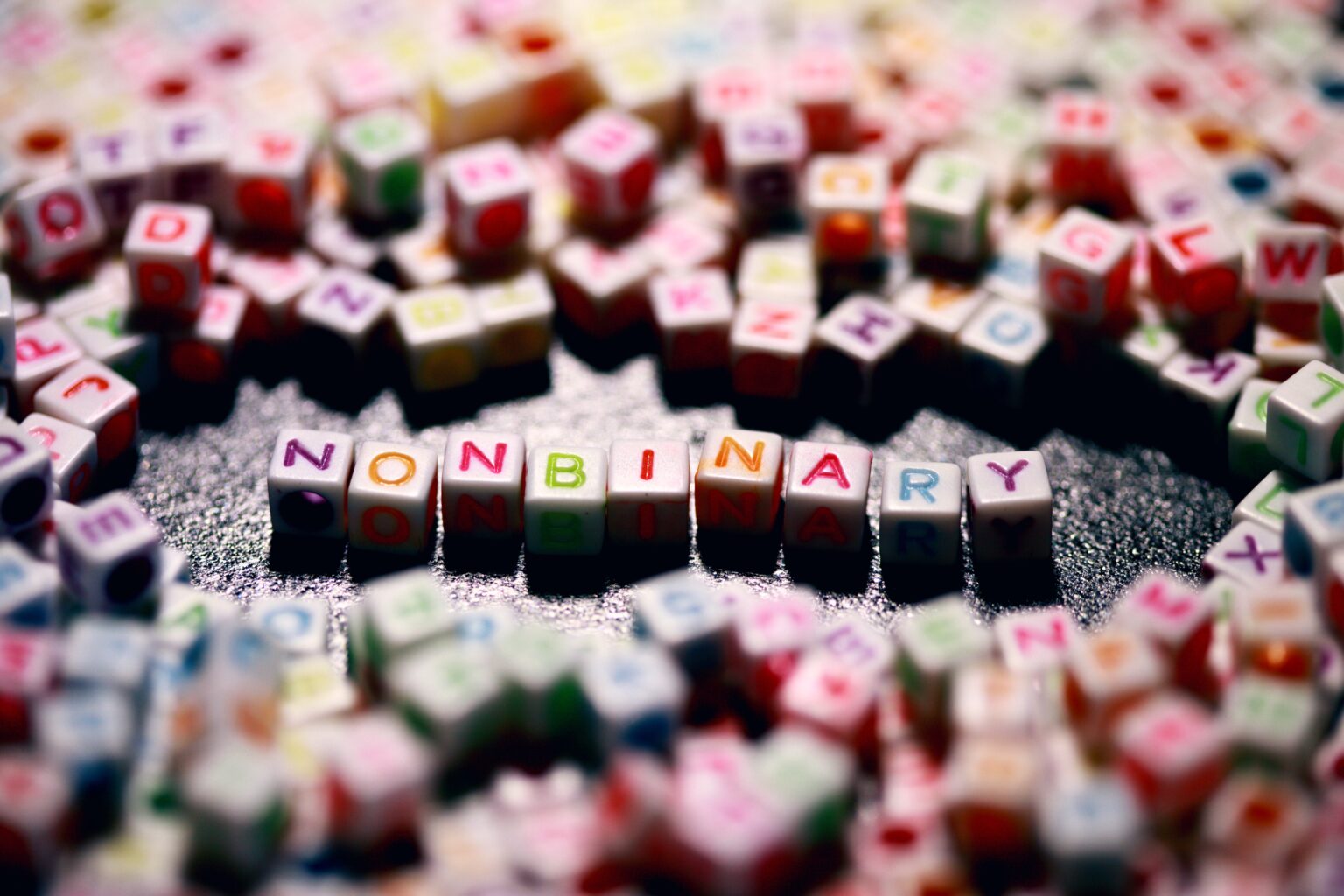
M/F/X/Other: Do you know what non-binary gender markers can be registered today in Europe? To mark International Non-Binary People’s Day, we commend the countries that have introduced the registration of gender markers other than male or female, who using no gender markers at all in their official documentation, and those who are working to adapt their systems to recognise non-binary identities in the near future.
Allowing for non-binary gender markers in official documents is primarily an issue of accuracy, privacy, and respect for a person: non-binary people who must choose between only ‘male’ or ‘female’ gender markers are unable to have their documents match their identities, and as a result are often exposed to privacy violations because of assumptions about their sex assigned at birth.
When your government does not acknowledge or respect who you are, the psychological consequences can be significant. A major survey this year of LGBTI people, conducted by the EU Agency for Fundamental Rights (FRA), indicated that over 50% of trans respondents identified somewhere outside of the binary, while in the EU Trans Study, released in June 2020, one-quarter of the respondents who had not changed their legal gender said that the gender marker they needed were absent. Public opinion is also moving toward supporting non-binary markers: 46% of respondents to the 2019 Eurobarometer supported a third gender marker.
However, right now only three European countries recognise non-binary identities while three others have taken active steps to do so. As this forward trend continues, we hope more and more countries will join the push forward.
Iceland
Since 2019, Icelandic given names are no longer male or female in the national registry, thanks to the Gender Autonomy Act. Moreover, Icelanders registering their gender as “X” can take gender neutral family names meaning “the child of” instead of surnames designating an individual as someone’s son or daughter. However, this option is not available to those registered as male or female.
Germany
The category “divers” was introduced on driving licenses, birth certificates and other official documents in 2019, thanks to the efforts of activists and in particular, Vanja, a German citizen whose demands to be officially registered as “other” were rejected until 2017. However, this third gender category is technically only available only to intersex people who provide a medical certificate at the moment, which means it excludes trans people, non-binary people and intersex people who cannot present a certificate.
Malta
Since 2018, people who do not want to register their gender as male or female in Malta can mark “X” on their IDs. Not many laws in Malta differentiate according to gender. However, as ILGA-Europe found out in this research on non-binary gender registration models in Europe, individuals with an “X” on their IDs may encounter obstacles in the healthcare system, similar to those experienced by intersex people or trans men when, for example, trying to schedule gynaecologist visits. As stated in our research, “this is why it is crucial for anti-discrimination laws to cover gender identity, gender expression and sex characteristics in all spheres of life, including public and private actions.”
The countries taking steps forward:
Belgium
In January 2022, the government introduced a draft bill that will remove gender markers from identity cards. This follows a Constitutional Court ruling from 2019 that partially revoked the gender recognition legislation passed in 2017, stating it was discriminatory for non-binary people, as their gender identity could not be recognised. The ruling stated: “Persons having a non-binary gender identity should have the possibility of adapting the sex shown on their birth certificate to reflect their gender identity.” However, gender markers will only be removed from identity cards and not from the National Registry
The Netherlands
By 2024, Dutch ID cards will be gender-free. The government seeks to end “unnecessary” registration of gender where it is irrelevant. The cities of Amsterdam and Utrecht have already removed gender markers in some documents. In a few cases, the judiciary has ordered a non-binary gender marker to be inscribed. For example, an Amsterdam Court ruled on July 2021 that ‘X’ can be retroactively entered as a gender marker in birth certificates, instead of ‘sex cannot be determined’. However, these cases do not set legal precedents. At the moment, there is no law in place offering the possibility, without obstacles, to have a non-binary gender marker.
Greece
In September 2020, the Magistrate’s Court of Kallithea in Greece recognised non-binary gender identities, stating that the right of the individual to their names is a “statutory element” of their identity.
With our Rainbow Europe module, ILGA-Europe continues, alongside our member organisations to monitor countries across Europe and Central Asia for legislation affecting the lives LGBTI people and their human rights situation. To find out more about Rainbow Europe, click here.
Note: This is an update on our 2020 blog.
Complaint Filed with EC Against Lack of Free Movement for Same-sex Couples in Hungary

ILGA-Europe, alongside a Hungarian activist organisation, have filed a complaint against Hungary because of its refusal to implement the 2018 Coman judgement, which recognises that the term “spouse” includes same-sex spouses under EU freedom of movement laws.
Just ahead of the fourth anniversary of the ground-breaking 2018 Court of Justice of the European Union (CJEU) judgement giving freedom of movement to same-sex couples in the EU (Coman vs. The Romanian State), ILGA-Europe, alongside Hungarian LGBTI organisation, Háttér Society and supported by the law firm White and Case, have filed a complaint with the European Commission because of Hungary’s non-compliance with the judgement.
With a complaint already pending on Romania because it has not implemented the 2018 ruling, and is thus disrespecting EU law, proof has also been provided that Hungary also continues to ignore the judgement and is prohibiting freedom of movement for same-sex couples.
The Hungarian state body in charge of granting recognition to foreign marriages and foreign partnerships refuses to recognise same-sex marriages legally concluded in jurisdictions of other EU Member States, as obliged by the 2018 Coman ruling, thus impeding freedom of movement within the EU and breaching EU law.
The refusal of the Hungarian State to comply with the Coman judgment is illustrated in a recent opinion issued by the Hungarian Ministry of Justice, which, in essence, states that the validity of a foreign marriage should be assessed under the country’s International Private Law Act (IPLA). Under the IPLA, a foreign marriage shall only be valid if the legislative conditions in the countries of both spouses country laws are satisfied, in other words the laws of the States of which the spouse is a national. According to sec. 12(1) of the IPLA, however, foreign law is not applied if the result of its application would violate fundamental values and constitutional principles.
Following the standpoint adopted by the Ministry of Justice, the Hungarian authorities deprive the following same-sex couples of marriage recognition (and thus freedom of movement):
- A same-sex marriage legally concluded abroad (including in other EU jurisdictions) with a Hungarian national. The Hungarian authorities do not allow for a recognition of a same-sex marriage with Hungarian nationals since Hungarian law does not provide for same-sex marriage.
- A same-sex marriage legally concluded abroad (including in other EU jurisdictions) where both of the spouses personal laws allow for same-sex marriage. The Hungarian authorities do not allow for recognition of same-sex marriage, because they consider it contrary to Hungarian public policy, and in alleged violation of the fundamental values and constitutional principles of the Hungarian legal system.
Active Steps To Make Life for Same-sex Couples More Difficult
In addition, requests for recognition of foreign same-sex marriages have not merely been denied, the Hungarian State has also taken active steps to make the lives of same-sex couples even more difficult than they were at the time the Coman ruling was delivered.
Since 2019, third-country nationals (non-Hungarian, non-EU) cohabiting with a Hungarian citizen, whether formally registered with public notaries as cohabiting partners or not, are no longer considered as their “family member,” thereby denying them basic immigration rights. This additional hurdle has worsened the conditions of same-sex couples in Hungary. Whereas the recognition of same-sex marriages has always been denied, third-country nationals living with a Hungarian citizen outside of a registered partnership will now also be denied the right to reside permanently in Hungary.
This situation is in clear violation of EU law and the 2018 Coman ruling of, as well as Art. 21(1) and Art 4(3) of the Treaty on the Functioning of the European Union (TFEU) and the Directive 2004/38/EC on the right of citizens of the Union and their family members to move and stay in the territory of the Member States.
The landmark Coman ruling was adopted four years ago, recognising that the term “spouse” includes same-sex spouses under EU freedom of movement laws. The ruling was supposed to provide same-sex spouses with much-awaited freedom of movement and long-overdue equal treatment throughout the EU. However, on its fourth anniversary, not only has Mr Hamilton, the spouse of Mr Coman, still not been granted residency in Romania, but legislation in both Hungary and Romania continues to violate the right to freedom of movement for same-sex couples.
The CJEU explicitly held that the refusal to recognise the same-sex marriage of an EU citizen, which constitutes a restriction of their right to move and reside freely within the EU under Art. 21(1) TFEU (Coman, § 40), cannot be justified on public policy and national identity grounds (Coman, §§ 41-50). Numerous administrative procedures have been pursued in Hungary, notably by Háttér Society. Háttér assist same–sex couples to apply for domestic registration of their same–sex marriage concluded outside Hungary, either as marriage or as a registered partnership, in order to obtain a right of residence. Such applications have, to date, always been rejected.
According to Katrin Hugendubel, Advocacy Director with ILGA-Europe, “We urge the Commission to investigate the complaints filed regarding Hungary and Romania, and to take all steps at its disposal, to ensure that Hungary, Romania, and indeed all Member States, respect the Coman ruling at the Court of Justice of the European Union. In essence, the ruling states that all EU member states are obliged to recognise legally concluded same-sex marriages in other member states, whenever this is necessary to secure the freedom of movement of the same-sex spouse.”
Polish public broadcaster TP in EU Court for Discrimination Against Self-employed LGBTI Person
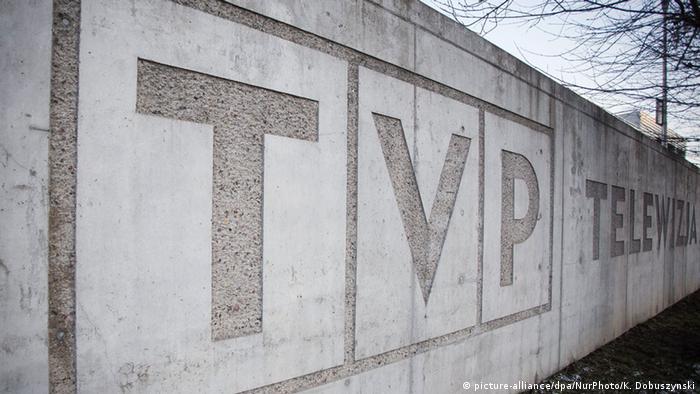
Today, the case of J.K. vs the Polish public broadcasting company TP, in which the applicant is seeking compensation for the discontinuation of his freelance contract after he appeared in a YouTube video with his same-sex partner, is being heard for the first time at the Court of Justice of the European Union.
Today, the CJEU is holding a preliminary hearing in the case C-356/21, to decide whether the refusal to continue a contract of work with a self-employed person on the basis of that person’s sexual orientation violates EU law.
In the case, the applicant, J.K., is seeking compensation from the Polish public broadcaster TP for the breach of the principle of equal treatment on the grounds of sexual orientation in the form of direct discrimination in the context of the employment relationship between the two parties.
The Applicant is openly a member of LGBTI community, and together with his partner, he engages in the activism for LGBTIQ+ rights, including by running a popular YouTube Channel.
The Defendant is the Polish public broadcaster, a nationwide public TV network which employs over 2 000 workers, fully owned by the State Treasury, intended to fulfil a public service mission. During 2010 – 2017, the employment relationship between the Applicant and the Defendant was based on regularly concluded, consecutive short-term contracts for specific work.
In December 2017, the Applicant and his partner released a Christmas video on their YouTube Channel, where they appeared among other members of the LGBTIQ+ community. Two days after the video was posted, the Applicant received an e-mail from his immediate supervisor cancelling his scheduled shifts. He was also informed that the Defendant was not planning to cooperate with the Applicant any longer. He was replaced by another employee, who had neither the qualifications nor the experience to perform the tasks previously performed by the Applicant.
Three Member States (Belgium, the Netherlands, and Portugal) and the European Commission, have filed written statements in support of the Applicant. All of them argue that the Member States may not exclude from the scope of Directive 2000/78 in their national law, the freedom of choice of the party to contract, to the extent that it is based on sexual orientation.
Poland, on the other hand, argues that the termination of contract and refusal to conclude a further contract with a self-employed person, even if based on that person’s sexual orientation, does not violate EU law.
According to Arpi Avetisyan, Head of Litigation with ILGA-Europe: “With this case, the CJEU has the opportunity to clarify the scope and practical applicability of the principal of non-discrimination based on sexual orientation, in the field of employment and occupation. This case could strengthen the standard and confirm that the fact that a person has been hired as a self-employed person is irrelevant for the purposes of protection from discrimination, both regarding access to employment and its termination.
“Otherwise, to allow limitation the scope of Directive 2000/78 would legitimise discriminatory choices of employers and contracting parties, and could encourage businesses to work more frequently with self-employed workers, as outside the framework of employment contracts, they would be free to discriminate.
“Any arguments of Poland in the present case are in fact contrary to the general principle of non-discrimination based on sexual orientation. Moreover, also under the Directive that self-employed persons would be less protected than other employees.”
Bulgarian Court Rules Baby Sara Must Be Issued Birth Certificate
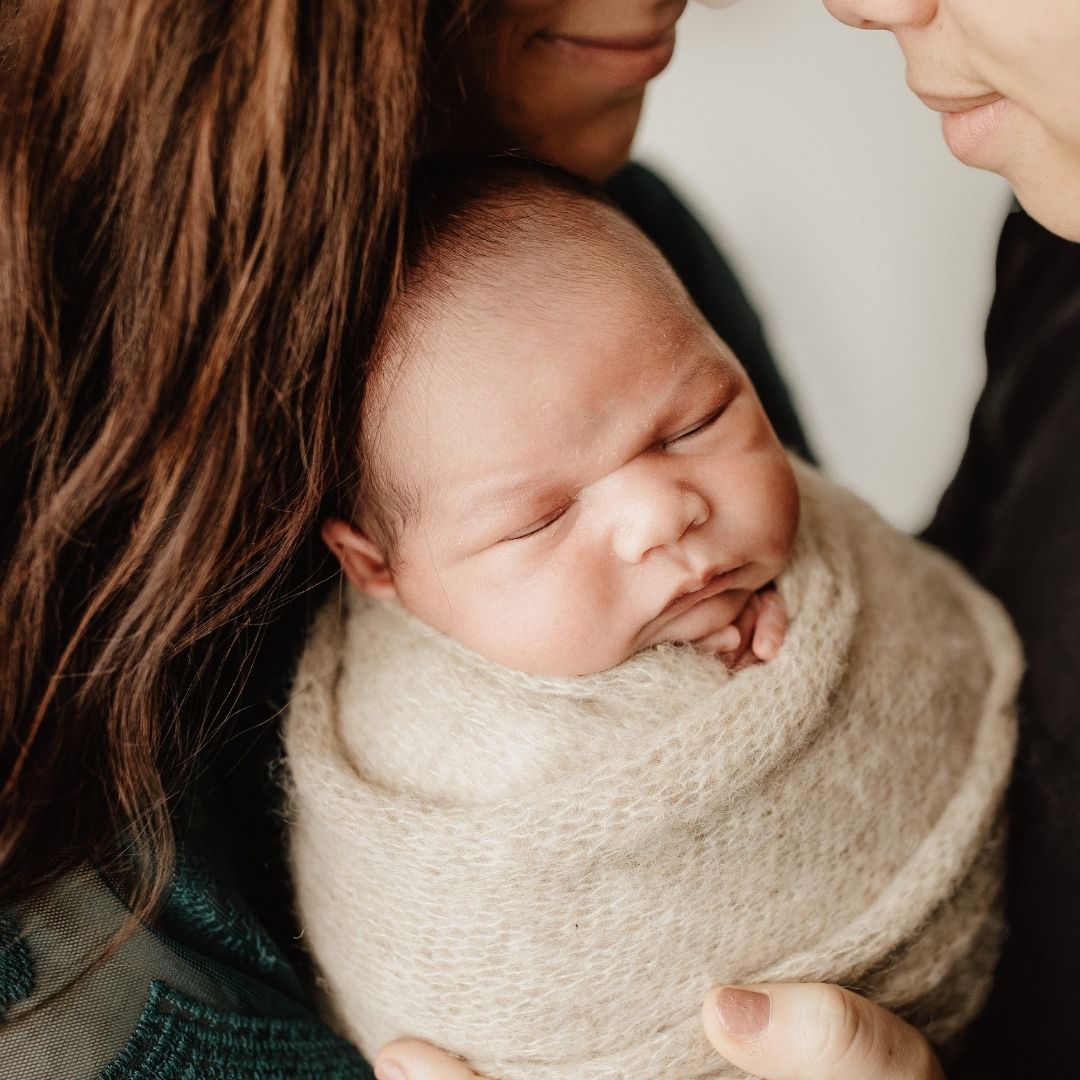
A Bulgarian court has ordered city hall authorities in the capital city of Sofia to issue a birth certificate to the baby born to a same-sex couple from Bulgaria and Gibraltar, known as ‘Baby Sara’.
The court’s decision was declared on Monday (16 May) follows a ruling last December by the Court of Justice of the European Union (CJEU), saying that if one EU member state recognises a parental relationship between a child and its parents, then all member states should, in order to give the child it’s right to freedom of movement.
The case ‘Stolichna obshtina, rayon Pancharevo’ arose when a same-sex couple were refused a birth certificate in Bulgaria for their infant daughter, who was born in Spain. The Bulgarian authorities asserted that the couple, one of whom is Bulgarian, could not be registered as parents on the child’s birth certificate, leaving the family in legal limbo, and Baby Sara stateless.
The CJEU ruled that it is contrary to the fundamental rights guaranteed by Articles 7 and 24 of the Charter for the child to be deprived of the relationship with one of her parents when exercising her right of free movement or for her exercise of that right to be made impossible or excessively difficult on the ground that her parents are of the same sex.
The ruling asserted that the Bulgarian authorities are obliged to issue an identity card or a passport to Baby Sara, which all other EU Member States are obliged to recognise.
Welcoming the Bulgarian court ruling that Baby Sara must be issued her birth certificate in light of the CJEU judgement, Arpi Avetisyan, Head of Litigation at ILGA-Europe, which provided strategic legal support during the proceedings before the CJEU, said: “The decision from Sofia Administrative Court sets a model example for applying the CJEU’s judgment in Baby Sara’s case. The Court acted swiftly and with clarity. All eyes are now on the Bulgarian authorities to comply with the Sofia Administrative Court decision and issue the birth certificate promptly. At ILGA-Europe, we couldn’t be happier for Baby Sara and her parents to finally be able to be recognised and travel as a family. All rainbow families across the EU should be able to enjoy their right to freedom of movement, without fragmentation and discrimination.”
The decision of the Bulgarian court comes almost on the fourth anniversary of another landmark CJEU decision in favour of freedom of movement for rainbow families, the Coman judgement against Romania, which has yet to be implemented by Romanian authorities.
On 5 June 2018, the CJEU ruled that the term spouse includes same-sex spouses under EU freedom of movement laws. Four years on, Clai Hamilton, spouse of Romanian citizen Adrian Coman, has not been granted residency yet in Romania.
According to Avetisyan, “It is very disappointing that four years on we are still talking about implementation of Coman judgment – both in relation to the applicants themselves, but also for other couples in Romania who continue suffering as a result of authorities’ unwillingness to make the necessary changes. This judgment was a big achievement for establishing equal rights for all EU citizens to enjoy their freedom of movement, without discrimination based on sexual orientation.
“We trust the European Commission will act firmly to ensure that EU law is implemented, in Romania and other Members States all across the EU, and make sure rainbow families are treated equally and with dignity.”
European Court Rules Against Armenia Inaction in Anti-LGBTI Hate Crime Case
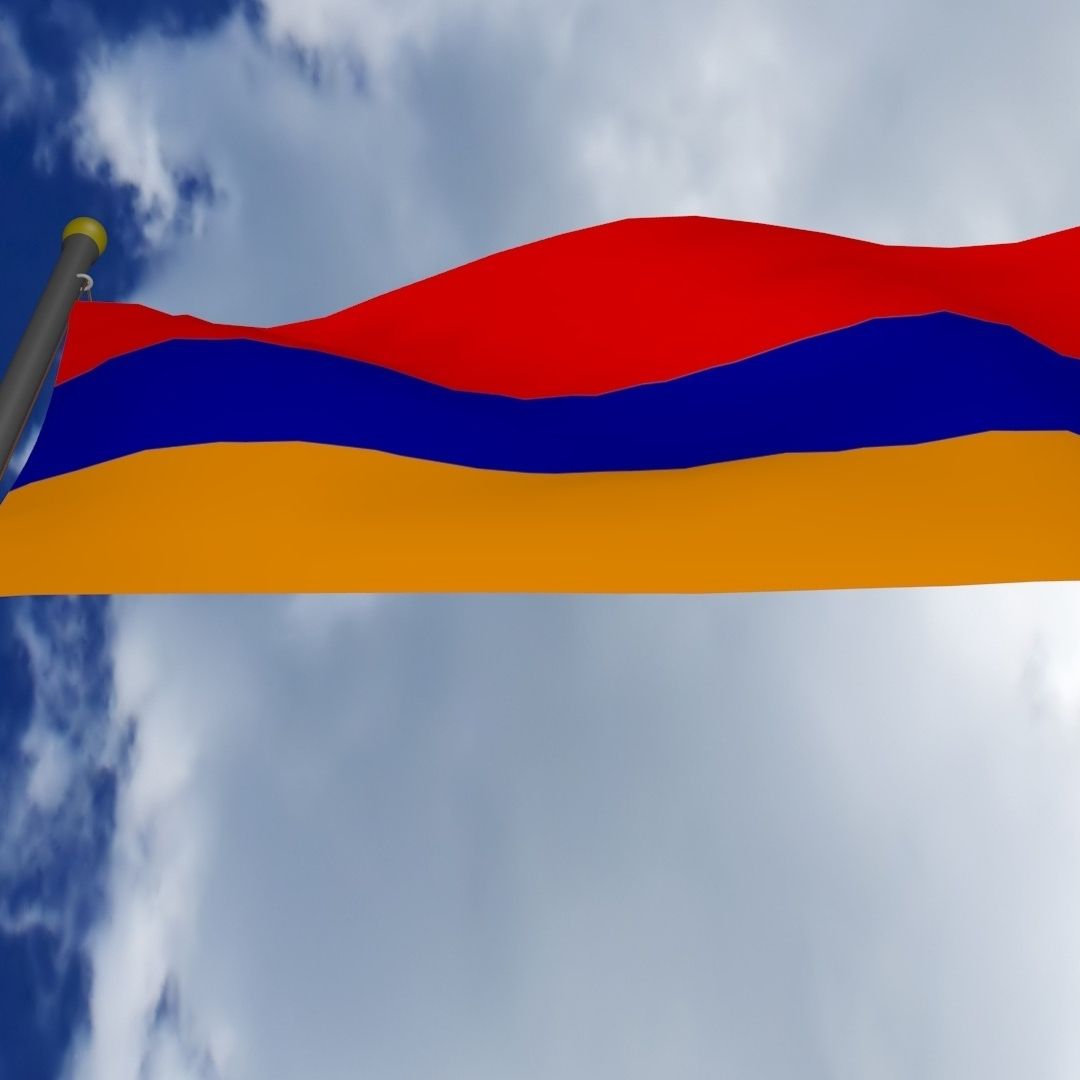
The European Court of Human Rights has ruled that authorities in Armenia failed to protect an LGBT bar owner and activist from homophobic physical and verbal attacks, and arson, and to carry out effective investigation.
The case Oganezova v. Armenia originated in May 2012, when a bar co-owned by the applicant, a member of the LGBT community in Armenia, was firebombed and caused significant damage. Following the incident, the applicant was subjected to physical attacks, death threats and hate speech. As a result, she left Armenia for Sweden, where she was granted asylum.
While two perpetrators were identified and admitted the attack, and were found guilty of intentional damage to property, the were handed a suspended two-year prison sentence, and were subsequently given amnesty.
The European Court’s judgment is two-fold, addressing authorities’ failure to conduct an effective investigation into the arson attack without considering the homophobic motive, and secondly, failure to protect the applicant from the threats and harassment against her in the aftermath.
The Court found that the continuous harassment of the applicant and the prevailing negative attitude towards the members of the LGBT community in general must have caused the applicant feelings of fear, anguish and insecurity which are not compatible with respect for her human dignity and reach the threshold of severity within the meaning of Article 3 (prohibition of torture, inhuman and degrading treatment) of the Convention, taken in conjunction with Article 14 (prohibition of discrimination).
In relation to the investigation, while the arson attack was formally investigated and the perpetrators convicted, the legal assessment of the crime took no account of the hate motive of the arson attack, “effectively rendering this fundamental aspect of the crime invisible and of no criminal significance”.
Given that the domestic criminal legislation does not provide that discrimination on the grounds of sexual orientation and gender identity should be treated as a bias motive and an aggravating circumstance in the commission of an offence, law enforcement did not have necessary legal mechanisms to apply in this case. Therefore, the authorities failed to discharge their positive obligation to investigate in an effective manner whether the arson attack on the club which was motivated by the applicant’s sexual orientation constituted a criminal offence committed with a homophobic motive. Thus, the Court found violation of Article 3 together with Article 14 on the authorities’ failure to conduct effective investigation and subsequently protect the applicant from further attacks and harassment.
According to ILGA-Europe’s Head of Litigation, Arpi Avetisyan: “This is a very timely and important judgment, symbolically delivered on the International Day Against Homophobia, Biphobia, Intersexphobia and Transphobia (IDAHOBIT. The judgment makes it clear that without legislation which explicitly covers bias-motivated crimes based on sexual orientation and gender identity, such crimes will remain invisible and foster impunity. We trust Armenian authorities will put in place necessary legislative measures to prevent the occurrence of similar cases taking place in the future.”
Armenia currently ranks at 47 on our Rainbow Europe Map, ranks all 49 European countries on a scale between 0% (gross violations of human rights, discrimination) and 100% (respect of human rights, full equality). To find out more visit Rainbow
Europe here.
A.B. and K.V. v Romania
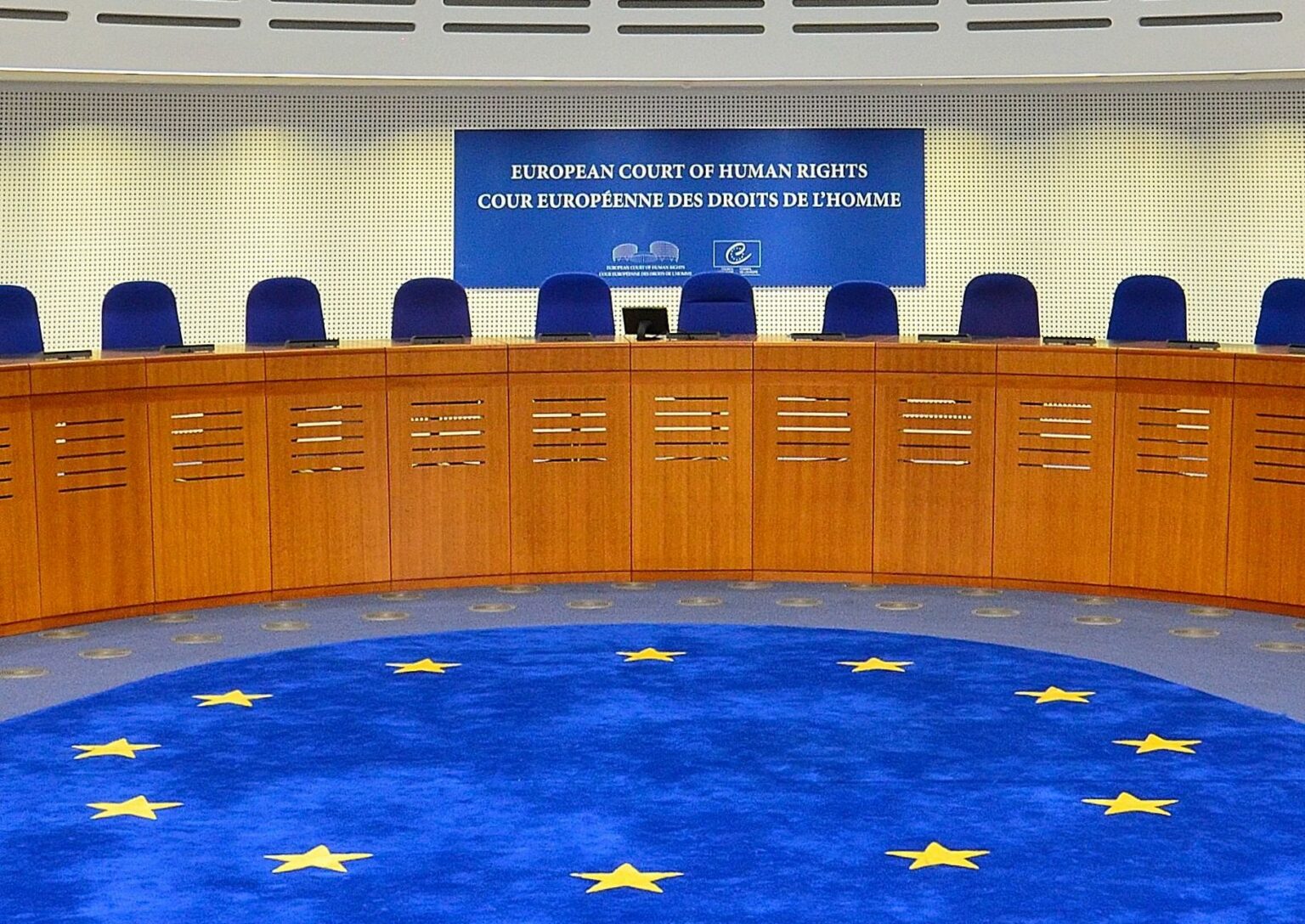
Recognition of same-sex marriages in the context of freedom of movement in the EU through the prism of implementation of CJEU’s Coman judgment
Submitted jointly by ILGA-Europe and AIRE Centre
The 5 trending attacks on the fundamental rights of LGBTI people in the EU in 2021
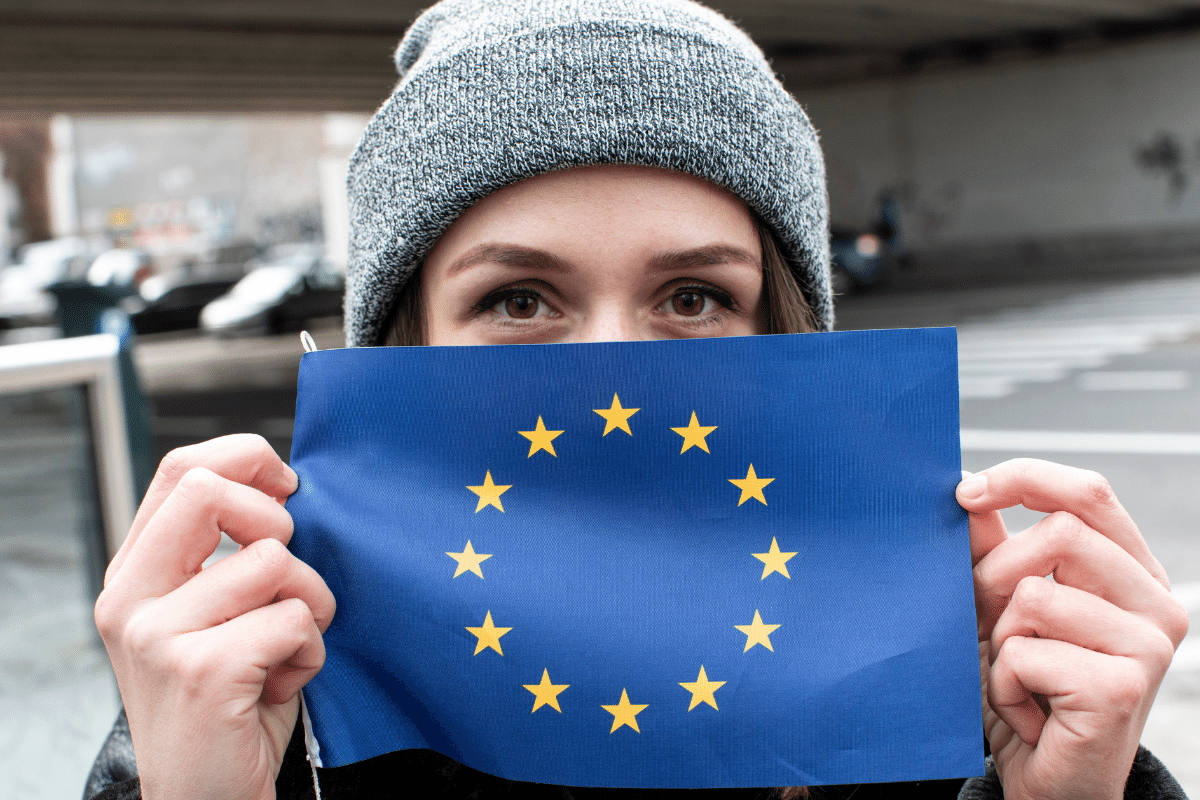
Right now, as the war on Ukraine escalates, democracy, human rights and equality matter more than ever in Europe. In our submission to the European Commission’s annual Rule of Law report, we’ve identified key trends in the systematic attacks on the rights of LGBTI people across EU member states.
With the ongoing Russian invasion of Ukraine, which is also a fundamental attack on democracy and freedom, we need to be working harder than ever to protect human rights and equality in Europe. The EU’s Rule of Law mechanism is one way in which this can be done. It can be used to ensure EU institutions react strongly to human rights violations across its member states. In the EU, rule of law means that all members of a society, including governments and members of parliaments, are equally subject to the law, under the control of independent and impartial courts.
The rule of law is important because it has a direct impact on the life of every citizen of the EU, and it ensures that laws protecting fundamental rights and democracy are respected by everyone, and can be enjoyed by everyone. It is a fundamental value upon which the EU is based.
Over the past few years it has become increasingly clear that many government-led violations of LGBTI rights in EU member states, go hand-in-hand with an undermining of the rule of law. In ILGA-Europe’s submission to this year’s EU Rule of Law Report, we’ve reported on the systematic attacks on the fundamental rights of LGBTI people across the EU, which have been enabled by the weakening of rule of law and democratic structures in several member states.
ILGA-Europe, with the input of various national-level LGBTI organisations, has submitted written input to inform the 2022 annual report, in order to ensure the violations of LGBTI rights linked to rule of law deterioration are recognised by EU institutions, and are addressed in their follow-up with member states. Here are the trends which we have highlighted to the EC:
Anti-LGBTI bias
In countries where the freedom of the judiciary is weakened, we have been witnessing political interference or bias in court cases related to LGBTI rights. For example, in Poland, the Ministry of Justice uses its powers to repeatedly appeal verdicts that were in favour of LGBTI defendants.
Also, in countries where media freedom is under attack, we are seeing more prevalence of anti-LGBTI bias, smear campaigns and even censorship of LGBTI content. Some LGBTI organisations are facing funding restrictions.
Arbitrary use of COVID-19 regulations
In certain countries, COVID-19 regulations have been applied in a discriminatory manner or have been used arbitrarily to restrict the freedom of assembly of LGBTI people. States of emergency have allowed governments to fast-track legislation unrelated to the pandemic, but which directly attack the rights of LGBTI people.
The most well-known example of this is the anti-paedophilia legislation adopted by Hungary in June 2021, which includes provisions which ban the “portrayal and the promotion of gender identity different from sex at birth, the change of sex and homosexuality” for persons under 18, and applies these to a number of regulations related to child protection, family, education, media and advertisement.
The European Commission started infringement proceedings against Hungary due to this law in July 2021. A similar law has since been tabled in Slovakia, is being drafted in Romania, and has been suggested for drafting in Poland and Croatia.
Judgments are not implemented
Judgments of the Court of Justice of the EU (CJEU) or the European Court of Human Rights (ECtHR) continued to not be implemented last year. The most notable of these is the Coman case from 2018, on freedom of movement for same-sex spouses. Due to its non-implementation in Romania, the country where the case started, it has been taken to the ECtHR. An official complaint was also submitted to the European Commission, with a similar case.
Rise in hate crime and hate speech against LGBTI people
Across the EU, hate speech by politicians was a serious issue during 2021, creating an unsafe environment for LGBTI civil society and often being related to a rise in hate crime and hate speech against LGBTI people more broadly. In some EU countries, LGBTI activists are receiving death threats online. In 2021 alone, offices of LGBTI organisations were attacked in Belgium, Bulgaria, Ireland, the Netherlands, Romania, and Spain. Staff and volunteers of LGBTI organisations were also attacked in Bulgaria, Croatia, Finland, Lithuania, Romania and Slovenia, many of which happened after anti-LGBTI smear campaigns in the media. Stickers with the design of the Polish “LGBT-free Zone” sticker appeared in various cities in Belgium, Bulgaria and Latvia. These incidents have led to an effective restriction of LGBTI people’s right to freedom of association, freedom of assembly and freedom of expression.
Hate crimes are not investigated
Hate crimes against LGBTI people often are still not sufficiently investigated. A number of EU countries still do not have hate crime legislation with sexual orientation, gender identity or sex characteristics as aggravating grounds. In some countries which do have such legal protection, it is often not implemented properly by police, prosecutors or even Ombudspersons.
So, what can be done?
The EU has a number of tools at its disposal to ensure the respect of the rule of law in all EU countries. The European Commission (EC), the executive arm of the EU, is responsible for guaranteeing the respect of rule of law.
The EU can take specific steps against violations of LGBTI rights in member states, that is if they go against EU legislation and/or if they are rule of law violations. Instruments the EC can use in such cases include so-called infringement procedures, as we see against Hungary and Poland at the moment, triggering Article 7 of the Treaty of the EU, to suspend certain rights from a member state, as well as cuts in EU funding based on rule of law violations
The EU annual rule of law report highlights breaches of EU and national law, including erosion of democratic standards. Based on this report, the EU institutions talk with EU countries, as well as national parliaments, civil society and other stakeholders in order to address concerns and avoid deterioration.
We hope that our remarks are heard and that the EC will integrate them in its annual Rule of Law Report. LGBTI rights are human rights and must be protected the same way rule of law should be respected in every EU country.
Behind the smokescreen of anti-LGBTI rhetoric in Europe, there’s a groundswell of allied determination to tackle hatred, report finds
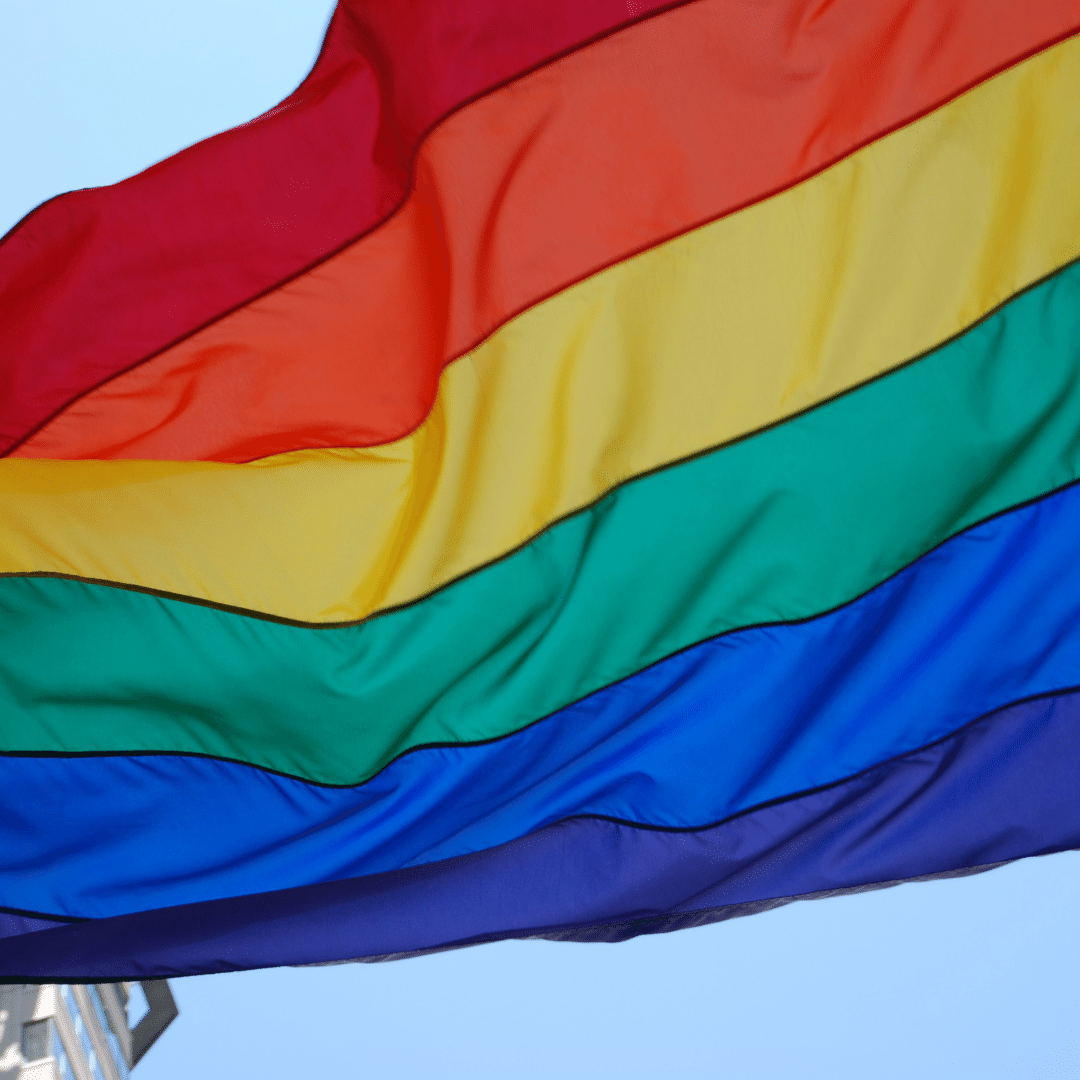
A report from the leading LGBTI organisation in Europe finds that amid a rise in official anti-LGBTI rhetoric fueling a wave of hate crime in every country in Europe, there is a growing institutional resolve to tackle hatred and exclusion.
Published today, February 15, 2022, ILGA-Europe’s Annual Review of the Human Rights Situation of LGBTI people in Europe and Central Asia finds that while there was a staggering rise in 2021 of anti-LGBTI rhetoric from politicians and other leaders, fuelling a wave of violence, with anti-LGBTI hate crime reported in every country, the response to this has been an allied determination in many countries, and at the European level, to tackle hatred and exclusion of LGBTI people.
Politicians in countries across Europe, not just in the usually reported Hungary and Poland, have continued to demonise LGBTI people over the past year, leading to a stark rise in anti-LGBTI attacks, burning of rainbow flags, and targeting of young LGBTI people in particular. A particular low point of the year came on June 15, with Hungary’s introduction of legislation which introduced a ban on the “portrayal and the promotion of gender identity different from sex at birth, the change of sex and homosexuality” for persons under 18.
Reported violence against LGBTI people in this context across Europe was rife. Germany, for instance, had a 39% increase in anti-LGBTI hate crime, while a new app in France, where users can report anti-LGBTI hate crimes, collected reports of 3,896 incidents in its first year. In the second year of the COVID-19 pandemic, domestic violence against LGBTI family members continued to take place widely. There were murders, assaults, corrective rapes, and anti-LGBTI police brutality. In many countries where police brutality took place, the police were not held accountable.
Anti-gender and anti-trans rhetoric have remained widespread, often targeting youth in particular. The narrative pitching trans rights against women’s rights also continued apace this year, and in this context there was stagnation in legal gender recognition (LGR) reform in many countries.
According to Executive Director of ILGA-Europe, Evelyne Paradis: “The spread of anti-LGBTI and trans exclusionary rhetoric outlined in this report has a very real negative impact on people’s lives. In country after country, we see how it negatively impacts people’s mental health and their sense of safety, their access to employment and the overall ability to progress much needed legal protection. At this moment in time, it is essential we remind politicians, media, academics – and sadly even some civil society actors – that real people’s lives are at stake in every country across the region, because of the political scapegoating of LGBTI people.”
In the context of this political scapegoating, national human rights institutions (NHRIs) and courts in many countries have begun to strengthen their work to protect the rights of LGBTI people. The European Court of Human Rights delivered several positive judgments this year, on hate crimes, freedom of assembly, LGR and family rights.
By far the strongest commitment to LGBTI human rights from European Union level came when the European Commission (EC) in July opened landmark infringement procedures against both Hungary and Poland. The European Parliament also adopted its resolution on LGBTIQ rights in the EU, strongly supporting the EC’s objective to propose legislation in several areas of protecting LGBTI rights, and condemning where member states have not been respecting EU law as regards LGBTI rights.
Said Katrin Hugendubel, Advocacy Director at ILGA-Europe, “This report narrates an unparalleled year in Europe, with regional and national institutions and courts taking their obligations to the human rights of LGBTI people with utmost gravity amid the now crystal clear escalation of the instrumentalisation of hatred against LGBTI people for political gain and expanded power. The advance of using hatred of any minority as an instrument of political gain, which we have seen throughout history, must be addressed and halted with allied determination across the region.”
It is also clear from this report that state-sponsored anti-LGBTI rhetoric and legislation is not matched by public opinion. Support for LGBTI people has never been stronger. In Hungary, for instance, a representative poll commissioned by Amnesty International Hungary and Háttér Society and conducted by polling agency Medián between 13 and 19 July 2021, found that 73% of Hungarians reject the government’s false claim that gay and lesbian people abuse or harm children.
A clear majority of Hungarian society (74,5%) believe that transgender people should be able to change their gender and name in their official document, while 59% support same-sex marriage. Hardly any Serbians know trans people, but 60% think they should be protected from discrimination. 68% of Romanians think all families, including rainbow families, should be protected, while 40% of Bulgarians would support a party that is pro-LGBTI.
According to Soudeh Rad, co-chair of the ILGA-Europe board: “While these numbers and outcomes of similar polls are promising as heartwarming illustrations of the strength and impact of the work carried out by civil society and the LGBTI movement at global, regional, and local levels, we must not forget the struggles activists across Europe and Central Asia face in realising a world where everyone can enjoy their human right to fully be themselves.”
Check out our Annual Review 2022.
Navigate the Annual Review chapters by country, institution or theme at our Rainbow Europe module!
For further comment, please contact ILGA-Europe’s Communications and Media Officer Ana Muñoz Padrós at ana@ilga-europe.org or +32 493356055.
Annual Review 2022
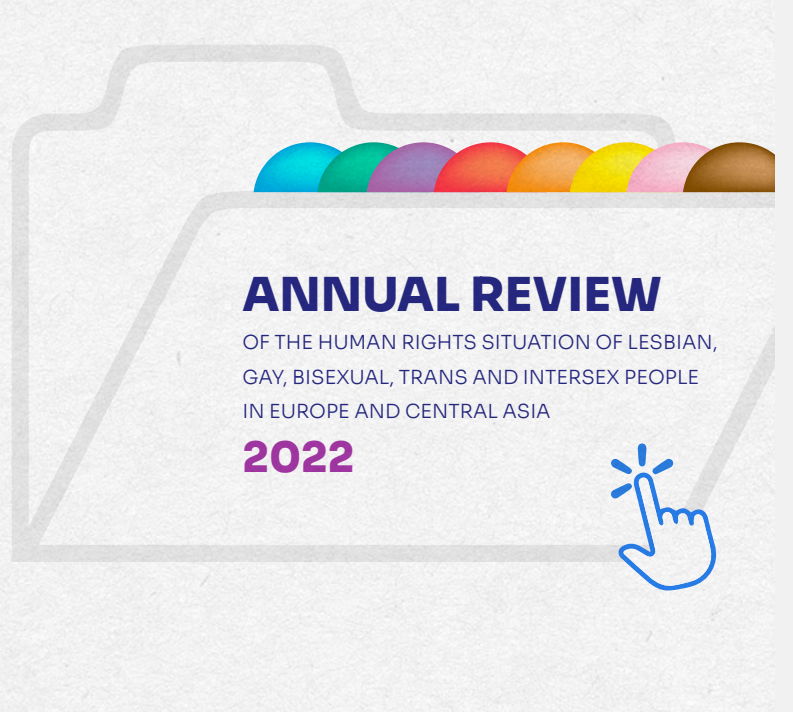
The Human Rights Situation of Lesbian, Gay, Bisexual, Trans and Intersex People in Europe and Central Asia between January-December 2021.
The Annual Review is ILGA-Europe’s annual publication documenting legal, political and social developments in 54 countries and 4 European institutions over the past calendar year. It is a unique report tracking key positive and negative trends in relation to LGBTI equality and human rights in Europe and Central Asia.
This year’s review finds that behind the smokescreen of anti-LGBTI rhetoric in Europe, there’s a groundswell of allied determination to tackle hatred.